



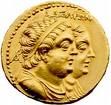











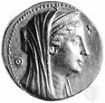


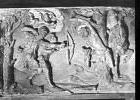
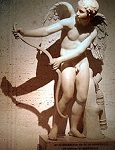
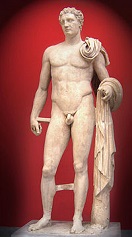
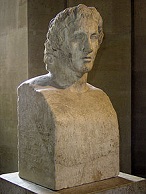
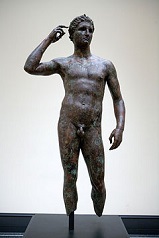
-300 The 120th Olympiad. Roman consuls: Marcus Valerius Maximus Corvus (5th time) and Quintus Appuleius Pansa. King Lysimachus of Thrace marries Arsinoe II (-316 to -270), full sister of Ptolemy II, and renames Ephesus after her - dirty old man cradle robber? Agathocles of Syracuse invades Italy and establishes his power in Bruttium. King Seuthes III of the Ordysian kingdom dies after obtaining partial autonomy in Thrace. About this time Citium, Cyprus-born Greek philosopher (of Phoenician descent?) Zeno of Citium (-334 to -262) founds the Stoic School of Philosophy in Athens, named from the Stoa Poikile or Painted Porch in Athens, which teaches that it is man's duty to accept his fate, that virtue is the highest good, and that the passions (destructive emotions) are to be condemned and moral and intellectual perfection to be sought by purging them in favor of goodness and peace of mind, stressing the life of virtue in accordance with Nature. Roman plebeians are admitted to the priesthood of the pontifical and augural colleges, and the plebs are now PC, as long as they are wealthy; during this cent. admission to the Senate becomes a hereditary privilege of the nobilitas (patricians and wealthy plebs), and the Senate becomes powerful; too bad the poor plebs are screwed, causing them form a popular party to challenge the aristocratic party - somebody help me through this nightmare, I can't escape this hell? In this cent. the city of Salona on the Jadro River in Croatia is founded near the Greek cities of Tragurian and Epetian, growing to 60K pop. and becoming the capital of the Roman province of Dalmatia; it is destroyed in the 7th cent. C.E. invasions of the Slavs and Avars, leaving large ruins. In this cent. the tribal Berber kingdom of Mauretania (Mauritania) on the coast of modern-day Morocco is founded, becoming a client state of the Roman Empire in 33 B.C.E., and a full Roman province in 40 C.E. after the death of last king Ptolemy of Mauretania (-13 to 40). About this cent. the principality of Chach (Chachkand) on the Chirchik River near the foothills of the West Tian Shan Mts. builds a square citadel 5 mi. S of the Syr Darya River, which grows into the city of Tashkent (City of Stone) (Turk. "tash" = stone) (modern-day pop. 2.3M) by the 17th cent. C.E. after Genghis Khan destroys it in 1219 and it is rebuilt, becoming a strategic center on the Silk Road, reaching 100K pop. in 1809; in May 1865 it is conquered by Russia, becoming the capital of Russian Turkistan. In this cent. the Yayoi people from N China, known for rice culture, pottery, and iron migrate to Japan. In this cent. the Romans establish a settlement called Matrice on the banks of the Manzanares River in Spain, which later becomes Madrid (modern-day pop. 3.1M/6.5M). In this cent. the Celtic Biturges (Gael. "kings of the world") move into SW France, and later divide into two tribes, with capitals at Bourges and Burdigalia (Bourdeaux) on the Garonne River; the region is called Aquitania ("land of waters"), with the first capital at Saintes; their legendary king Ambigatus allegedly sent his sister's son Bellovesus and Segovesus to lead settlers into N Italy and the Hercynian Forest; meanwhile the city of About this time the city of Toulouse (Tolosa) (modern-day pop. 479K/1.3M) on the Garonne River in S France 93 mi. from the Mediterranean Sea and 420 mi. from Paris is founded by the Celtic tribe of Tolosates or Volques (Volcae) Tectosages (Tectosagi); origin of the name Welsh? In this cent. the city of Scupi (modern-day Skopje) (Gr. "skopein" = lookout") on the Vardar River in Macedonia on the N-S route between the Balkans and Athens (modern-day pop. 506K) is founded by the Celtic Dardanians (Dardani) ("oak people") of Paionia (Macedonia), who make it the capital of Dardania in the next cent. In this cent. the Laginian tribe of Celts from Armorica (Brittany) migrates to Leinster (Laighi), Ireland; a branch called the Galioin (Gailenga) settle N of Dublin and Meath and begin warring with the Firbolgs (Erainn), pushing them out of NW Connacht. In this cent. the proto-Slavic Sarmatians move W and kick Scythian butt, occupying the great plains from the Black Sea N to the Baltic and from the Vistula to the Volga Rivers (until 2nd cent. C.E.). Iberian culture flowers in this cent. under Greek and Carthaginian influence - let's get the party going, it's still anybody's game? About this time the city of Ankara (Ancyra) ("anchor") (modern-day pop. 5.2M) is settled by Greeks from Pontus, becoming a trading center between ports on the Black Sea, Crimea, Assyria, Cyprus, Lebanon, Georgia, Armenia, and Persia; About this time the city of Nicosia in N Cyprus (modern-day pop. 116K/323K) is rebuilt on the site of Ledra by Leucus, son of Ptolemy I Soter, and named Leucoton or Lefkotheon; in the 4th cent. C.E. Lefkosia (Kallenikesis) becomes the seat of bishop St. Tryphilius (Trifilios), a student of St. Spyridon; in 647 Salamis is destroyed by the Arabs, and in 965 Nicosia becomes the new capital of Cyprus; on Sept. 9, 1570 the Ottomans capture and sack it, causing Turks to immigrate to the N and Greeks to hide-out in the S; on July 5, 1878 Nicosia comes under British rule; in 1955-64 a Greek revolt attempts to oust the Turkish pop., causing Turkey to invade in 1974, causing Nicosia to become the only world capital shared by two powers. In this cent. Chaldean priest Berosus (Berossus) ("Bel is his shepherd") brings astrology to Greece. In this cent. the Tamil Chola Dynasty in S India is founded in the Kaveri River Valley, lasting until 1279 C.E., vying for a longevity record; also the Tamil Pandya Dynasty, and the Tamil Chera Dynasty, whose rulers becomes known as "the three crowned rulers (muventar) of Tamil country"; the Chola Dynasty spawns the Chola Nadu cultural religion, known for Shola stunted evergreen montane forests. In this cent. the canal-building Hohokams migrate N from present-day Mexico and settle in the Gila and Salt River valleys of Ariz.; the Anasazi (Ancestral Puebloans) and Mogollon cultures are founded in the Four Corners area of modern-day Ariz., Utah, Colo., and New Mexico (ends 1200 C.E). In this cent. Greeks begin working as teachers in Rome, and upper-class Romans begin learning Greek - by -146 every Roman aristocrat can own one? In this cent. Roman men begin wearing their hair short. The first Roman silver coins are produced about this time. In this cent. Alexandrian poet Herodas (Herondas) fluorishes, writing many mimes, a new lit. form defining a character along with a diverting incident in less than 100 lines, some of which are discovered on papyri in 1891 C.E. Rinthon of Tarentum, founder of Roman comedy (mock tragedies) lives in this cent. In this cent. an Iberian stone relief is made in Osuna, Seville, Spain, showing a kissing man-woman pair in profile. Inventions: About this time the Samaritans invent the Saddle with breastplate and girth. Architecture: In this cent. the Bavikonda (Telugu "hill of wells") Buddhist temple is built in Andhra Pradesh, containing an alleged bone fragment from Buddha. The Aztecs (Choluteca) begin the 400m x 400m Choula Pyramid (finished 800 C.E.), becoming the biggest pyramid on Earth. Science: About this time Euclid of Alexandria (-325 to -265) pioneers deductive mathematics, and proves the infinitude of the prime numbers, providing the first examples of formal mathematical proofs and algorithms. The Magnetic Compass first appears in China in this cent., but it is used to determine propitious burial of the dead, not navigation until 1119 C.E. Nonfiction: About this time the oldest surviving copy of the Panchatantra (Five Treatises) is written, an ancient Indian collection of interrelated animal fables in Sanskrit verse and prose arranged within a frame story with the message of how princes can live a wise, good life, going on to become the most translated lit. work of India after Persian physician Burzoy (Burzoya) (Burzawayh) travels to India in 570 C.E. and returns with it, translating it under the title "Karirak ud Damanak"; source of Aesop's Fables? In this cent. the Book of Enoch begins to be composed; it incl. the Book of the Watchers (chs. 1-36), about the fall of the Watcher Angels, who fathered the Nephilim, the Book of Parables of Enoch (chs. 37-71), the Astronomical Book (Book of Heavenly Luminaries) (chs. 72-82), the Book of Dream Visions (chs. 83-90), and the Epistle of Enoch (chs. 91-108). Deaths: Greek sculptor Lysippus (b. -390) in Sicyon; dies after having cranked out 1.5K+ bronze sculptures in his well-manned workshop, and seen many replicas circulate on the market; known for a one-to-eight scale for the head and total height of the body, making them appear slender and taller, with exaggerated facial features.
-299 Demetrius I, with aid from Seleucus I expels Cassander's brother Pleistarchus from Cilicia. The Third Samnite War begins (ends -290) when the Etruscans attempt to turn an invasion of their territory by the Gauls around by bribing them to ally with them in an attack on Rome, but after they get the money they won't do it and leave the area, causing the Romans under consul Titus Manlius Torquatus, allied with the Picentes on the Adriatic coast, the Senone Gauls in the N, and the Pretutii in the S to invade Etruria; too bad, Torquatus is killed in a riding accident, and is replaced by Marcus Valerius Corvus Calenus, who ravages the land while the Etruscans hole-up in their forts. Roman consuls: Titus Manlius Torquatus and Marcus Fulvius Paetinus. Births: Greek Peripatetic philosopher Lyco (Lycon) of Troas (d. -225); son of Astyanax; disciple of Strato.
-298 The Samnites invade the territory of the Lucanians, causing Rome to declare war on them, sending an army under consul Gnaeus Fulvius Maximus Centumalus, which captures Samniium, Bovianum, Vetus, and Aufidena. while another Roman army under consul Lucius Cornelius Scipio Barbatus attacks Volterrae in N Etruria and lays all Etruscian territory N of of the Tiber River waste. Cassander dies, and his young sons Antipater and Alexander V rule jointly in Macedon, but soon have a falling out. Roman consuls: Lucius Cornelius Scipio Barbatus and Gnaeus Fulvius Maximus Centumalus. Deaths: Macedonian gen. Cassander.
-297 After returning with backing from Ptolemy I and agreeing to rule as co-king, Pyrrhus regains his throne in Epirus, killing chump Neoptolemus II and becoming sole king, later founding the seaport of Antigonia (Antigonea) (later Troas) in Chaonia on the Aegean Sea in NW Asia Minor, posth. named for one of his wives, Antigone (-318 to -295), daughter of Berenice. Philip IV (d. -297), son of King Cassander becomes king of Macedonia, but dies 4 mo. later during an invasion of Greece, and his brother Alexander V (d. -294) becomes sole king of Macedonia; his brother Antipater II (d. -297) vies for the throne. Prince Zipoites I of Bithynia leads a revolt against Macedonian rule, and becomes king #1 of Bithynia (until -278). Indian ruler Chandragupta Maurya commits religious suicide by Itvara. Roman consuls: Quintus Fabius Maximus Rullianus and Publius Decius Mus II (3rd time).
-296 The 121st Olympiad. Ptolemy I acquires Pamphylia and Lycia from Demetrius I. The first temple in Rome dedicated to bloody-scourge-carrying Roman goddess of war Bellona (sister-wife of Mars) is built in the Campus Martius next to the Temple of Apollo Sosianus and the Theater of Marcellus near the Servian Wall by Appius Claudius, and the site is used by the Senate for official receptions of foreign ambassadors and declarations of war. Roman consuls: Appius Claudius Caecus and Lucius Volumnius.
-295 Demetrius I sieges and recovers Athens; Lachares and Phaedros are elected rulers of Athens. The Romans under consuls Quintus Fabius Maximus Rullianus (Rullus) (Lat. "uncultivated", "beggar") and Publius Decius Mus the Younger (who does the devotio thingie like his dad and seeks death in battle to gain divine assurance of a Roman V) defeat a large force of Samnites, Etruscans, Umbrians, and Senone Gauls (Celts) at the Battle of Sentinum in Umbria (in the Marche NE Italy on the Apennine ridges), causing the Gauls to scatter and the Umbrians to become kaput. Roman consuls: Quintus Fabius Maximus Rullianus and Publius Decius Mus Junior (4th time). Nonfiction: Euclid (-325 to -265), Optica; first text on geometrical optics. Deaths: Greek physician Diocles of Carystus (b. -375); dies after writing the first medical treatise in Attic (not Ionic), and inventing a surgical instrument for the extraction of arrowheads called the Spoon of Diocles (Dioclean Cyathiscus); also leaves A Letter on Preserving Health, addressed to Antigonus II Gonatas of Macedon (-319 to -239).
-294 Demetrius I kills Alexander V, son of Cassander, seizes Macedonia, then sets his sights on NE and C Greece, eventually taking all of it except Aetolia. Greek physician Erasistratus of Ceos (-304 to -250) diagnoses Seleucis I Nicator's eldest son Antiochus I Soter as lovesickness, and when asked who it is, he claims it's his own wife, causing Seleucus I to pontificate that he should give her up, whereupon he reveals that it's really his own hot new queen Stratonice, causing Seleucus I to give her up; Erasistratus goes on to co-found the Medical School of Alexandria with Herophilus of Chalcedon (-335 to -280); after doing the first dissections (vivisections)? Erasistratus studies the brain, distinguishing between the cerebrum and cerebellum; Herophilus studies the nervous system, distinguishing between sensory and motor nerves; Herophilus calls the pineal gland a "sphincter which regulates the flow of thought". Lachares, Phaedros, and Olympiodorus are elected rulers of Athens. Roman consuls: Lucius Postumius Megellus and Marcus Atilius Regulus.


-293 After revolting in -313, the Thracian Getae (Getai) (Gets) tribe of the Lower Danube River under king (since -300) Dromichaetes (Dromichaites) (d. -280) defeats and captures Macedonian king of Thrace (since -306) Lysimachus (-360 to -281), who is released after he grants their independence. Architecture: The 108-ft. (33m) (70 cubits) Colossus of Rhodes (the Greek god Helios, patron god of Rhodes) (finished in -282) is begun by Greek sculptor Chares of Lindos to celebrate the V in -305 over the invading Macedonians under Demetrius I, using iron tie bars with a shiny brass skin that never tarnishes, mounted on a 50-ft.-high white marble pedestal near the Mandraki Harbor entrance, all compliments of materials and weapons left behind; too bad, it is destroyed in an earthquake in 226 B.C.E.; Chares commits suicide before the statue is finished because he grossly underbid the contract, and it is finished by Laches of Lindos? Roman consuls: Spurius Carvilius Maximus and Lucius Papirius Cursor. Births: Greek poet Apollonius of Rhodes (Apollonius Rhodius) (d. -215); librarian in Alexandria, Egypt.
-292 The 122nd Olympiad. Roman consuls: Quintus Fabius Maximus Gurges and Decimus Junius Brutus Scaeva.

-291 On Jan. 9 emperor (since -393) Kouan (b. -427) dies, and Kourei (Korei) (-342 to -215) becomes Japanese Yamato emperor #7 (until -215) - who's bragging? The Romans finally defeat the Samnites. Roman consuls: Lucius Postumius Megellus and Gaius Junius Brutus Bubulcus. Deaths: Japanese Yamato emperor #6 (-393 to -291) Kouan of Yamato (b. -427) on Jan. 9. Greek playwright Menander (b. -342).
-290 The Romans force peace with the Samnites and gain control of C Italy, taking Samnite land for Latin colonization, and ending the Third Samnite War (begun -298); the Sabines are given Latin rights; the Gauls still control the Po Valley, and the Greeks still control some cities in Magna Graecia (S Italy) - but they know their time is coming? The Aetolian (Aitolian) League in Aetolia in W Greece is formed by the semi-barbarian Aetolians to fight the Achaean League and Macedonia, holding biannual meetings in Thermika and Panaetolia, occupying Delphia and expanding over all of C Greece outside of Attica and Boeotia by the end of the cent. Mainus (d. -262) becomes king of Scotland. By this time the Po Valley is inhabited by three main Celtic tribes: the Boii in the S, with capital at Bononia (Bologna), the Cenomani in the center, and the Insubres in the N; to the E live the non-Celtic Veneti, and to the W (in the Apennines in NW Italy N of Etruria) (also in SE Gaul and Switzerland) live the non-Celtic Ligurians, who become a commercial people controlling the mountain passes between Italy and Switzerland until the Romans kick their butts. Roman consuls: Publius Cornelius Rufinus and Manius Curius Dentatus. Nonfiction: About this time Babylonian historian-astronomer-priest Berossus (Berosus) ("Bel is their shepherd") writes History of Babylonia (Babyloniaca) (3 vols.), and Procreatio.

-289 Roman consuls: Marcus Valerius Maximus Corvinus and Quintus Caedicius Noctua. Agathocles (-361 to -289), tyrant of Syracuse (since -317) and king of Sicily (since -304) dies after returning to Syracuse and restoring democracy and prohibiting his sons from succeeding him as king; too bad, a band of Campanian mercenaries calling themselves the Mamertines ("sons of Mars") seize Messina (Messana) and begin raiding the trade of Syracuse. Deaths: Chinese philosopher Mencius (b. -372); leaves Meng-tse-shu (Book of Mencius); one of the four shu written by the disciples of Confucius: "Heaven hears as the people hear." Greek king of Sicily (-304 to -289) Agathocles (b. -361).
-288 The 123rd Olympiad. King Pyrrhus of Epirus and King Lysimachus of Thrace drive Demetrius I out of Macedonia, and he flees to Syria.
-287 Roman consuls: Marcus Claudius Marcellus and Gaius Nautius Rutilus. Olympiodorus and Demochares are elected rulers of Athens. The Fifth (Third) Secession of the Plebeians to the Janiculum Hill on the W side of the Tiber River opposite its N bend results in Roman dictator Quintus Hortensius passing the Lex Hortenisa, making plebiscita passed by the concilium plebis binding on all Romans; the patrician-plebeian struggle ends with the formation of a joint nobility, but a "novus homo", a man without office-holding ancestors needs the help of a nobleman to obtain high office. Lysimachus builds a 6 mi. (10 km.) circumference wall around Ephesus. Theophrastus (b. -371) dies, and his pupil Strato of Lampsacus (-335 to -269) becomes dir. #3 of the Lyceum in Athens. Births: Greek mathematician-physicist-engineer Archimedes (d. -212) in Syracuse, Sicily, Magna Graecia. Deaths: Greek philosopher-botanist Theophrastus (b. -371); leaves Historia Plantarum; descriptions of 500+ species of plants.
-286 Roman consuls: Quintus Hortensius (dictator) and Marcus Valerius Maximus Corvinus and Gaius Aelius Paetus. Pyrrhus takes Thessaly and the W half of Macedonia. Demetrius I attempts to campaign in Asia Minor, but is captured and imprisoned by Seleucus I in Cilicia. Ptolemy I acquires Caria and the island of Cos. Births: Greek Seleucid king (-261 to -246) Antiochus II Theod (d. -246) in Syria; son of Antiochus I Soter and Stratonice (daughter of Demetrius Poliorcetes). Deaths: Chinese writer Chuang-tzu (b. -369): "Rewards and punishments are the lowest form of education."
-285 Roman consuls: Marcus Aemilius Lepidus (3rd time) and Gaius Claudius Canina. The Gaullic Senones invade Roman territory again, and massacre Romans on the Tiber River, causing them to begin an anti-Trick-or-Treat revenge tour. Ptolemy I's son Ptolemy II Philadelphus becomes co-regent of Greek-run Egypt. An earthquake in Japan sinks Lake Biwa along with an 800 sq. mi. area of Oomi Province and raises Mt. Fuji (Ainu "fire"). Deaths: Athenian ruler Olympiodorus. Greek philosopher Crates of Thebes (b. -365) in Boeotia.
-284 The 124th Olympiad. Roman consuls: Gaius Servilius Tucca and Lucius Caecilius Metellus Denter. Lysimachus (d. -281) defeats Pyrrhus and adds Macedonia to his kingdom. The Gauls siege Arretium and defeat a Roman army under consul Lucius Caecilius Metellus Denter, who is KIA; the Romans defeat the Gauls at the Battle of Lake Vadimon in Etruria, and annex the territory of the Senones (ager Gallicus) along the Adriatic (ends -283). Zenodotus of Ephesus becomes head librarian #1 of the Library of Alexandria, going on to divide Homer's Iliad and Odyssey into 24 books each, file mss. to different rooms based on subject matter, and attach tags to each scroll containing indexing info. Births: Greek poet (in Rome) ("Father of Roman Poetry") Lucius Livius Andronicus (d. -204) in Tarentum (modern-day Taranto, Italy); becomes slave to a Livian noble in -272, who later frees him, causing him to adopt his name and go Roman, like Ben-Hur?


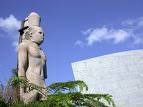
-283 Roman consuls: Publius Cornelius Dolabella and Gnaeus Domitius Calvinus Maximus. The Romans under consul Publius Cornelius Dolabella drive the Senones out of Roman territory, and they never return, probably joining other bands of Gauls headed to Macedonia, Asia Minor, and the Danube River; the Romans found a colony at Sena Gallica (modern-day Senigallia). Demetrius I dies in captivity, and his son Antigonus II Gonatus ("Knock-Kneed") (-319 to -239) claims the throne of Macedonia. In 283 B.C.E. Macedonian Greek gen. Ptolemy I (b. -367) dies after telling Euclid of Alexandria that his Elements is too hard to study and receiving the reply "There is no royal road to geometry", leaving History of the Conquests of Alexander; after a catfight between his 3rd and 4th wives Eurydice (daughter of Antipater of Macedon) and Berenice I, his co-regent (since -285) son Ptolemy II Philadelphus (-309 to -246) (Berenice I's son) becomes king #2 of the Egyptian 32nd (Ptolemaic) Dynasty, sole ruler of Egypt and Libya, and is crowned next Jan. 7, pissing-off Euyrice's son Ptolemy Keraunos (Ceraunus) ("thunderbolt") (d. -279) (ceramic anus?), who had grown up thinking he would be Ptolemy I's heir, causing him to move to the court of Lysimachus, king of Macedonia, Thrace, and W Asia Minor, whose wife Arsinoe II is his half-sister. The N part of the Anti-Roman Coalition (founded -338) is defeated, and the S part goes to the top of the list. The Romans under Gen. Sulla conquer the Etruscan town of Fiesole (Faesulae), where every year 12 young Roman men had been sent to study divination in their famous augur school; Sulla colonizes it with veterans, who later support Cataline under their leader Gaius Mallius. Deaths: Indian PM Chanakya (b. -350).
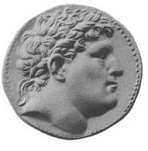

-282 Roman consuls: Quintus Aemilius Papus and Gaius Fabricius Luscinus. In summer Seleucus I begins preparing his army after Arsinoe II poisons her hubby Lysimachus' mind against his son and intended heir Agathocles and gets him to order his execution, and Agathocles' wife Lysandra and her brother Ptolemy Keraunos flee to his court in Babylon, asking for aid to place a son of Agathocles and Lysandra on the throne. After the Romans mop-up the S states of the Anti-Roman Coalition, the Greek colony of Tarentum pisses them off by sinking four Roman ships that had sailed into their waters (claiming violation of their maritime treaty of -334) in retaliation for Roman occupation of the Greek city of Thurii in Magna Graecia (S Italy), then driving a Roman garrison from Thurii, causing Rome to declare war, beginning the Pyrrhic War (ends -272). Lysimachus deposits 9K talents of gold with his general Philetaerus (-343 to -263), who uses it to set up the Attalid Kingdom in Pergamon (Pergamos, Pergamum, Pergamom, Akropol). Art: The Colossus of Rhodes (begun -293) is completed; too bad, it only lasts 56 years (until -226). About this time Greek sculptor Xenokrates of Sicyon flourishes, becoming the world's first art historian and leaving several vols., making a fan of Pliny the Elder.

-281 Roman consuls: Lucius Aemilius Barbula and Quintus Marcius Philippus. In Feb. after appointing his son Antiochus as his successor, Seleucus I (b. -358) defeats and kills Lysimachus (b. -361), ruler (since -306) of Thrace, Macedonia, and Asia Minor at the Battle of Corupedion (Corupedium) in Lydia near Magnesia ad Sipylum, winning all of Asia Minor and proclaiming himself king of Macedon; in Aug.-Sept. after crossing the Hellespoint en route to seizing Thrace and Macedonia, Seleucus I is treacherously assassinated (stabbed) by Ptolemy Keraunos, disinherited son of Ptolemy I Soter), earning him the nickname "thunderbolt", and Seleucus I's son Antiochus I Soter ("savior") (-324 to -261) becomes king of Syria, while Keraunos takes Macedonia (until -279), beginning the First War of Succession (ends -279) with Ptolemy II Philadelphus. The Tarentines send an embassy to Pyrrhus of Epirus offering him command of their combined armies, and Tarentum asks for his assistance against Rome, causing visions of becoming the successor to his distant kinsman Alexander III the Great and conquering first Rome then the entire Western World to dance in his head. Deaths: Greek Macedonian gen. Lysimachus (b. -361) in Feb. in Corupedium. Greek Macedonian gen. and Seleucid king #1 (-305 to -281) Seleucus I Nicator (b. -358) in Thrace (*assassinated)

-280 The 125th Olympiad. Pyrrhus sails for Tarentum with 20K foot, 3K horseman, 2K archers, 500 slingers, and 20 elephants, and gains a complete but costly V over the Romans at the Battle of Heraclea on the Siris River in Lucania by stampeding his elephants on the not-knowing-what's-going-on Romans after a long and bloody battle, becoming the original "Pyrrhic victory" when it depletes his forces too much to become the next Alexander III the Great, and after penetrating to within 20 mi. of Rome and failing to fake-out the Romans into surrendering he withdraws to winter quarters back in Tarentum. The Second Achaean League is formed by 12 towns in the N Peloponnese. Ariarathes II dies, and his eldest son Ariamnes II (d. -230) becomes ruler of Cappadocia (until -230), going on to share his throne with his son Ariathes III and gain independence from the Seleucid Empire. About this time the Gallic invasion of the Balkans sees an 85K-man army of Celtic Gauls from overpopulated Pannonia led by Cambaules and Brennus (Acichorius?) (d. -279) invade the Balkans, reaching N Bulgaria next year before splitting into three groups, with Brennus' group invading Paionia (Paeonia) N of Macedonia, group #2 led by Cerethrius, Leonnorius and Lutarius invading Thrace and Triballi, and group #3 led by Bolgius (Bolgios) (Belgius) invading Macedonia and Illyria. Roman consuls: Gnaeus Domintius Calvinus Maximus (dictator) and Publius Valerius Laevinus and Tiberius Coruncanius. Architecture: About this year after Ptolemy I Soter ordered its construction shortly after announcing himself king in -305, the 394 ft.-449 ft. (120m-137m) 800-talent limestone (Pharos) Lighthouse of Alexandria is finished by his son Ptolemy II Philadelphus on the small island of Pharos on the W edge of the Nile Delta, served by the port of Eunostos and its inner basin Kibotsos, connected with the Great Harbor of Alexandria to the E by the 1.2Km (7 x 180m) Heptastadium mole, becoming the world's first important lighthouse, guiding ships into the harbor for 1.6K years before being toppled by an earthquake in 1323 C.E.; the light is created by a furnace at the top; it is allegedly designed by Greek architect-engineer Sostratus of Cnidus; it is badly damaged by an earthquake in 956 C.E.; the last of its stones are used in 1480 C.E. to build the Citadel of Qaitbay; in 1994 C.E. French archeologists discover some of its remains; the mole is gradually filled-in, becoming the modern Ras el-Tin quarter of Alexandria. Births: Chinese political philosopher Han Fei Zi (d. -236) in Eastern Zhou. Greek writer (on mechanics) Philo of Byzantium (Mechanicus) (d. -220); lives in Alexandria, Egypt. Deaths: Greek philosopher Stilpo (b. -360) in Megara. Athenian orator Demetrius Phalereus (b. -350) in exile in Upper Egypt (snakebite). Greek physician Herophilus (b. 335) in Alexandria.
-279 Roman consuls: Publius Sulpicius Saverrio and Publius Decius Mus. In spring after they offer Ptolemy Keraunos the chance of paying them to keep them from attacking, and he underestimates them and turns down an offer of 20K soldiers from the Dardanians, then refuses to aid the tribes of Thrace against them, causing them to switch sides, the Celtic Gauls of Bolgius invade Macedonia and kick Ptolemy II's Keraunos' ceramic anus and capture and behead him after he is thrown by his his elephant, parading his head around on a spear, leaving Macedonia in anarchy, with rulership claimed successively by Keraunos' brother Meleager, Antipater Etesias, and Sosthenes; the First War of Succession in Syria (begun -280) ends by default; too bad, the Gauls don't follow-up their V in Macedonia, and Macedonian gen. Sosthenes (d. -277) assembles an army that forces Bolgios' troops to withdraw, only to be defeated by more Gauls under Brennus, after which 30K Gauls under Brennus defeat the Greeks at the Second Battle of Thermopylae after being held back for several mo., but are turned back at the Battle of Delphi after the Greek gods allegedly send them bad weather and the Celts go mad and slay 26K of each other; Brennus dies of his wounds, while his army retreats to the Spercheios River, only to be routed by an army of Thessalians and Malians; Arsinoe II flees to Alexandria after Ptolemy II Philadelphus executes her two younger sons. The original Et Tu, Brute? The Brutti, Lucani, and Samnites ally against Rome with Pyrrhus, who sends ambassador Cineas to the Roman Senate with a (cynical?) peace offer, demanding that the Romans stop aggression agains the Greeks of S Italy and restore lands taken from the Brutii, Apulians, and Samnites, which is rejected after blind ex-censor Appius Claudius Caecus rallies them against it; Rome and Carthage agree to support each other against Pyrrhus, who leads an army of Tarantines, Oscans, Samnites, and Greeks that routs the Romans at the hard-fought Battle of Ausculum in Apulia, then finds himself in yet another Pyrrhic V ("One more victory against the Romans and we shall be utterly ruined"), and withdraws to Tarentum again, sending Cineas with another peace offer, which goes nowhere; Publius Decius Mus III follows his father and grandfather in sacrificing himself in order to sic the gods on them in vain. Ptolemy II takes Miletus in SW Asia Minor from Antiochus I. Greek skeptic philosopher Timon of Phlius (-320 to -230), a disciple of Greek skeptic Pyrrho gives 'em hell with the line that people only need to know three things, their nature, how we are related to them, and what we can gain from them, but since our knowledge must always be subjective and unreal, we can only live in a state of suspended judgment - I prefer a real Savior? Singidunum ("round fort") (modern day-Belgrade, pop. 1.2M/1.6M) in Serbia at the confluence of the Sava and Danube Rivers is mentioned for the first time, populated by the Celtic (Gallic) Scordisci tribe, which conquers the regions of modern-day Serbia, Croatia, Bulgaria, and Romania before being absorbed as the Roman provinces of Pannonia, Moesia, and Dacia in the 1st cent. C.E.; the "dun" part is Celtic for fortress; the previous inhabitants were the Thracian tribe of Sings. Nephite prophet-king Mosiah I and his refugee people leave the Land of Nephi and settle with the people of Zarahemla in Central Am., who all become known as the Nephites.
-278 Pyrrhus campaigns against the Carthaginians in Sicily to help the Sicilian Greeks (until -276), and conquers all of it except Lilybaeum (Marsala); too bad his despotic I'm-Alexander-the-Great-eat-me attitude pisses-off the Greek cities, who withdraw their support in his fight against Rome, giving them time to recover? Zipoites I (b. -354) dies, and his eldest son Nicomedes I (-300 to -255) becomes king #2 of Bithynia, killing two of his three brothers, while #3 Zipoites II sets up an independent kingdom in Bithynia; meanwhile Antiochus I Soter of Syria invades, but withdraws without a battle after Nicomedes I allies with Heraclea Pontica and Antigonus II Gonatus. Ptolemy II explores the Upper Nile River, then crosses over the Red Sea into N Arabia to establish commercial routes. C Anatolia is occupied by the Celtic Galatians, who make Ankara the HQ of the Tectosages tribe, Pessinos (modern-day Balhisar) the HQ of the Trocmi tribe, and Tavium E of Ancyra as the HQ of the Tolstibogii tribe. Discredited Chinese statesman Qu Yuan (b. -348) commits suicide by jumping into the Mi Luo (Miluo) River in Hunan Province; the Chinese Autumn Festival is established to commemorate him. Roman consuls: Quintus Aemilius Papus and Gaius Fabricius Luscinus. Deaths: Bythinian king #1 (-326 to -278) Zipoites I (b. -326).

-277 Arsinoe II gets Arsinoe I, wife of her brother Ptolemy II exiled, then marries him herself, gaining them both the title "Philadelphoi" (Philadelphus) (brother or sister loving); an iron lady, she becomes a virtual co-pharoah - set the stage to mix and mingle? The moral of the story is clear, when you want milk and chocolate, make it Two Musketeers? An army of 20K Gauls led by Leonnorius et al. siege Byzantium and force them to pay tribute, gaining control of Lysimachia; they then luck out when Nicomedes I of Bithynia allies with them in an effort to rid his kingdom of his pesky brother Zipoites II, and helps them cross into Asia Minor to defeat and kill the pest, allowing Big Nick to become sole ruler of Bithynia; the Gauls then advance into Phrygia and colonize Galatia in the Kizil Irmak and Delice Irmak River basins on the great central plateau of Asia Minor, with capital at Ancyra (modern-day Ankara) (225 mi. ENE of Byzantium), mixing with a gaggle of Greeks and raising sheep and goats; meanwhile back in Macedonia, Antigonus II Gonatas defeats the Gauls under Cerethriius at the Battle of Lysimachia, and recovers Macedonia from the "wild men", establishing the Antigonid Dynasty (ends -168); the defeated Gauls move inland to Thrace and establish a kingdom with capital at Tyle (Tylis) (modern-day Kazanluk) (ends -211) - Spartacus' great-great-?-grandfather might be a Celt? The Romans take possession of Pythagoras' old town Crotona (Croton) in S Italy. Roman consuls: Publius Cornelius Rufinus and Gaius Junius Brutus Bubulcus. Deaths: King Sosthenes of Macedonia.
-276 The 126th Olympiad. The Greek Sicilians revolt against Pyrrhus, and he returns to Italy, crossing from Epirus to Brindisi (on Italy's heel), intending to kick Roman butt all along the Appian Way to Rome. Roman consuls: Publius Cornelius Rufinus (dictator) and Quintus Fabius Maximus Gurges and Gaius Genucius Clepsina. Births: Greek mathematician-geographer-astronomer ("greatest of all ancient geographers") ("founder of geodesy") Eratosthenes of Cyrene (d. -194) in Cyrene, Africa; pupil of grammarian Lysanias and poet Callimachus; estimates the Earth's circumference by measuring noon Sun angles in wells at Aswan and Alexandria, coming within 50 mi. of the correct value (approx. 25K mi.), and suggesting that the Sun moves around the Earth; measures the obliquity of the ecliptic with an error of 7 min. of arc; maps the course of the Nile River, adding the British Isles, India, and Ceylon to the map of the world; it takes until 1670 C.E. for Christian Europe to catch back up?


-275 Roman consuls: Lucius Cornelius Lentulus Caudinus and Manius Curius Dentatus. The Romans under Manius Curius Dentatus (d. -270) defeat Pyrrhus at the Battle of Malventum (Beneventum) ("bad wind"); Pyrrhus withdraws to Tarentum, decides to give up conquering the Romans and returns to Epirus, leaving Gen. Milo to defend it; Hiero II (-308 to -215), bastard son of Syracusan noble Hierocles is chosen as cmdr. of the army of Syracuse; the Romans establish a colony at Malventum, which they rename to Beneventum (Benevenuto)("good wind"). The Seleucids defeat the Gauls in Galatia. Archidamus IV dies, and his son Eudamidas II (d. -244) becomes Eurypontid king #24 of Sparta. Nonfiction: About this time Egyptian high priest Manetho writes History of Egypt (Aegyptiaca) (3 vols.) in Greek, becoming the first to divide rulers into dynasties. Greek-speaking Jews in Alexandria persuade Ptolemy II to order a Greek trans. of the Hebrew scriptures (Pentateuch) for the library of Alexandria, the Septuagint (Lat. "seventy"), a Greek trans. of the Hebrew scriptures sponsored by Egyptian king (-283 to -246) Ptolemy II Philadelphus (-309 to -246) (benefactor of the Alexandrian Library-Museum), begun by guess how many Hellenistic Jews in Alexandria (finished by -50). Births: Carthaginian statesman-gen. Hamilcar ("brother of Melqart") Barca (Barcas) ("lightning") (d. -228); father of Hannibal (-247 to -182), Hasdrubal (-245 to -207), and Mago (-243 to -203).
-274 The First Syrian War between Antiochus I and Ptolemy II Philadelphus begins (ends -271). Pyrrhus of Epirus, subsidized by Ptolemy II Philadelphus invades Macedonia, and defeats Antigonus II Gonatus after Macedonian troops join his army, driving Agonized Gonads II from Macedonia. Cyrene becomes independent (until -248). Roman consuls: Servius Cornelius Merenda and Manius Curius Dentatus (3rd time).

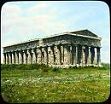
-273 Pyrrhus is called to Greece by Cleonymus, pretender to the Spartan throne. The Romans establish a colony at Paestum in Lucania, S Italy, and build a Doric Temple of Ceres there; by the 1st cent. B.C.E. it becomes famous for its roses, mentioned by several poets incl. Vergil. Bindusara Maurya dies, and in 269 after killing 99 of 100 brothers, his son Ashoka (Asoka) (Sansk. "without grief") Maurya (the Great) (-304 to -232), grandson of Chandragupta becomes king #3 of the Maurya Dynasty in Magadha, India (until -232), going on to become "the greatest ruler the world has seen" (H.G. Wells), and a patron of Buddhism, producing the earliest known writings in the sacred language of Pali (Sans. "row", "line", "series") ("language of mankind's philosophy"); the Seven Islands of Bombay (Mumbai) (named after the goddess Mumbadevi) on the W coast of India (modern-day pop. 12.4M/20.7M) are incorporated into the Maurya Empire (ends -180). Roman consuls: Gaius Claudius Canina and Gaius Fabius Licinius. Deaths: Roman politician Appius Claudius Caecus (b. -340). Indian king Bindusara Maurya (b. -297).
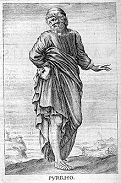
-272 The 127th Olympiad. Roman consuls: Spurius Carvilius Maximus and Lucius Papirius Cursor. Pyrrhus (b. -319) invades the Peloponnese with 25K infantry, 2K cavalry and 24 elephants to restore Cleonymus, and is met by Sparta and a coalition of Greek city-states; at the walls of Sparta the spunky Spartans tell Pyrrhus, "If thou art a god, thou wilt not hurt those who have never injured thee; if thou art a man, advance, and thou wilt find men equal to thyself" (Plutarch); Pyrrhus is paralyzed and KIA during a street fight in Argos by one of Antigonus II's soldiers (struck by a tile?); Antigonus II returns to Macedonia, establishing control of Greece by garrisoning Corinth, Chalcis (Euboea), and Demetrius (Thrace), making peace with the Aetolian League and backing pro-Macedonian tyrants in the Peloponnesus; with Pyrrhus kaput, Gen. Milo surrenders Tarentum, and the Romans win the Pyrrhic War (begun -282), and with it almost all of Italy S of the Po Valley, conquering the Brutti, Lucani, and Samnites, and garrisoning Tarentum and other Greek cities in S Italy; much of Sicily remains under Carthaginian control. The Aqua Anio Vetus aqueduct in Rome is built, originating at the Aniene (Teverone) River in Lazio, becoming one of 11 that eventually serve the well-watered Romans. Deaths: Greek Epirus king Pyrrhus (b. -319) in Argos (KIA). Greek skeptic philosopher (first) Pyrrho of Elis (b. -360) in Elis.
-271 Ptolemy II's Egypt defeats the Seleucids, ending the First Syrian War (begun -274); Syria loses Miletus, Phoenicia, W Cilicia, Pamphylia, and Lycia. Roman consuls: Lucius Genucius Clepsina and Caeso Quinctius Claudius.

-270 The Mamertines holding Messina (Messana) and harrassing the Syracusans are defeated by Hiero II of Syracuse at the Battle of Mylae (modern-day Milazzo) on the Longanus River; the Mamertimes call on the Carthaginians and Romans for aid, and the Carthaginians arrive first and capture the city, putting in a garrison at Messina; Carthage now becomes the guardian of sea law in the Mediterranean Sea; his military successes against the Mamertines cause the grateful citizens of Syracuse to elect former gen. of Pyrrhus of Epirus Hiero II (-308 to -215) as their king (tyrant) (until -215), becoming a wise and just ruler, later employing his kinsman Archimedes to engineer advanced hi-tech defense equipment to save the kingdom from the nasty Romans; he builds the Altar of Hiero II in memory of the fall of tyrant Thrasybulos in -466, which is celebrated annually in the Feast of Zeus Eleutherios (Zeus of Freedom) with a sacrifice of 450 bulls followed by a feast. Rome captures Rhegium (modern-day Reggio di Calabria) in S Italy from the Mamertines; minor rebellions continue in Etruria until -264. Egyptian king Ptolemy II Philadelphus hires an army of 4K Celtic warriors from the Balkans with the help of Antigonus II Gonatus, but after arriving in Egypt they begin plotting to take over, causing them to be captured and exiled on a deserted island in the Nile River, where they are starved to death. The old canal between the Nile and Red Sea of Darius I of Persia is reopened by Ptolemy II Philadelphus (until the 8th cent. C.E.). About this time Greek poet Theocritus from Syracuse flourishes, creating Greek bucolic poetry. Roman consuls: Gnaeus Cornelius Blasio and Gaius Genusius Clepsina. Births: Roman poet-playwright Gnaeus (Cnaeus) Naevius (d. -201); successor to Livius Andronicus. Deaths: Greek Skeptic philosopher Pyrrho of Elis (b. -360). Greek philosopher Epicurus (b. -341) in Athens (kidney stones) - happy now? Greek princess Arsinoe II (b. -316) in July.
-269 Roman consuls: Gaius Fabius Pictor and Quintus Ogulnius Gallus. Strato of Lampsacus (b. -335) dies, and his student Lyco (Lycon) of Troas (-299 to -225) succeeds him as dir. #4 of the Lyceum in Athens. Deaths: Greek Peripatetic philosopher Strato of Lamsacus (b. -335).

-268 The 128th Olympiad. Roman consuls: Appius Claudius Russus and Publius Sempronius Sophus. Ptolemy II Philadelphus of Egypt stirs up (and subsidizes) Athens, led by Chremonides to issue the Decree of Chermonides, declaring an alliance between Athens, Sparta, and Egypt against Antigonus of Macedon, causing the Chremonidean War with knock-kneed Macedonia next year (ends -261). Bindusara Maurya (b. -297) dies, and his son Ashoka (Asoka) (Sansk. "without grief") Maurya (the Great) (-304 to -232), grandson of Chandragupta becomes king of the Maurya Dynasty in Magadha, India, going on to become "the greatest ruler the world has seen" (H.G. Wells), and a patron of Buddhism, producing the earliest known writings in the sacred language of Pali (Sans. "row", "line", "series") ("language of mankind's philosophy"). Births: Roman statesman gen. Marcus Claudius Marcellus (d. -208).
-267 Roman consuls: Lucius Julius Libo and Marcus Atilius Regulus. The Romans led by consul Marcus Attilius Regulus (-308 to -250) conquer the Sallentini and capture the artificial port of Brundisium (modern-day Brindisi) on Italy's heel; he receives a triumph for it (24 white oxen); to qualify for a triumph one must kill at least 5K enemies and gather sufficient spoil; runners-up get a single white sheep (ovus)? Chremonides and Glaukon are elected rulers of Athens.
-266 Roman consuls: Numerius Fabius Pictor and Decimus Junius Pera. Rome completes the conquest of Italy to the Arno River and the Rubicon River.
-265 Roman consuls: Quintus Fabius Maximus Gurges and Lucius Manilius Vitulus. The Roman census counts 292,234 citizens in the Roman dominions in Italy S of the Arno River, showing how the Roman Republic is diffusing citizenship outside Rome itself for the first time in history. Areus I dies after introducing coined money, and his son Acrotatus (d. -262) (grandson of Acrotatus I) becomes Agiad king of Sparta, which is sagging under the concentration of land and wealth in too few hands, causing Phylarchus to accuse him of corrupting the simplicity of Spartan manners. Tian Dan uses the Fire Cattle Columns military tactic to reestablish the Qi (Chi) Kingdom in W China. The Romans first learn about Greek medicine from captured POWs. Chinese physician Huang Fu Mi writes Systematic Classics of Acupuncture and Moxibustion. Greek geometer Euclid (b. -325) dies, leaving his 13-vol. masterpiece Elements [of Geometry]: "There is no royal road to geometry" - levaes two Alexandrian Compasses in the garage?
-264 The 129th Olympiad. Roman consuls: Appius Claudius Caudex and Marcus (Quintus) Fulvius Flaccus, who launches a long distinguished career as a statesman and military cmdr., starting with the sacking of the Etruscan city of Volsinii (Vulsinii) (Velsuna) (Velzna) (modern-day Bolsena in Lazio or Orvieto in Umbria) in Umbria in C Italy, becoming the last Etruscan city to be taken by the Romans, breaking the spirit of the Etruscan League of Twelve Cities; a 5th cent. B.C.E. Etruscan necropolis is discovered there in 1874 C.E. The First Punic (Gr. "Phoenician") War (ends -241) begins when the Carthaginians allied with Hiero II of Syracuse siege the Mamertine pirates in Messina (Messana) and oust them, causing them to appeal to the New Big Cocks of Rome to kick the Carthaginians out, and the Romans decide to help them because of jealousy, defeating the Syracusan army; "So began the first of the most wasteful and disastrous series of wars that has ever darkened the history of mankind" (H.G. Wells); followed by the Second Punic War (-228 to -201) and Third Punic War (-149 to -146). Nicomedes I founds Nicomedia (modern-day Izmit) as the capital of Bithynia (NW Asia Minor), replacing nearby Astacus (Askatkos); it flourishes for the next six cents. The first recorded Gladiatorial Combat in Rome is held to honor the deceased Junius Brutus as the Romans decide to revive an old Etruscan sport with a modest display of three couples; Roman moralists approve of public violence and pain while disapproving of public kissing, ornaments on women, and Greek philosophy (which condemns gladiator events) - a quirk that survives into 20th cent. C.E. movies and TV? By this year the Romans have founded eight Roman colonies of 300 Roman citizens on the coast of Italy on land taken from conquered peoples to use for defensive purposes; other colonies of up to 4K settlers are established as military outposts, and are permitted self-govt.

-263 Macedonia begins a 2-year siege of Athens (ends -262). Philetaerus dies, and his nephew Eumenes I (d. -241) becomes king of Pergamon (Pergamum) (until -241); Ptolemy II Philadelphus then incites him to revolt from Antiochus I, becoming virtually independent. Rome sieges Syracuse and defeats Hiero II, causing him to make peace, sign a treaty, and become a Roman ally. Roman consuls: Gnaeus Fulvius Maximus Centumalus (dictator) and Manius Valerius Maximus Messala (Messalla) and Manius Otacilius Crassus. Architecture: The rebuilt Temple of Artemis in modern-day Selcuk, Turkey is destroyed. Deaths: Greek New Comedy poet Philemon in Athens; rival of Menander.
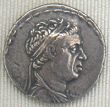


-262 Ptolemy II's son Ptolemy III, supported by his daddy begins seizing Ephesus (until -259). After Ptolemy II fails to give aid, Athens surrenders. Agrigentum (modern-day Agrigento) on the S coast of Sicily is captured by Rome after a trench war and the loss of 30K Romans through plague and starvation and war; the Carthaginians evacuate to the fortified towns on the W coast of Sicily, anchored by Lilybaeum, where the Carthaginian fleet can easily supply them from Africa. Ariamnes II dies, and his co-ruler son Ariarathes III (d. -220) becomes sole ruler of Cappadocia, going on to proclaim himself king (basileus) about -250 and add the Plain of Cataonia to his dominions. Zeno of Citium (b. -334) dies, and Cleanthes of Assos (d. -232) (from the town of Assos in coastal Asia Minor, where Aristotle later opens an Academy) becomes head of the Stoic School in Athens, going on to give materialism a religious flavor by comparing the Universe to a human being and the fixed stars to its soul, which makes it okay to worship them, and composes a Hymn to Zeus, praising cosmic order, law, and universal reason - sounds a lot like the Hebrew Jehovah? Acrotatus dies, and his son Areus II (d. -254) becomes Agiad king of Sparta (until -254). Roman consuls: Lucius Postumius Megellus and Quintus Mamilius Vitulus. Births: Greek mathematician ("the Great Geometer") Apollonius of Perga (d. -190); discoverer of the wonders of the ellipse and hyperbola. Deaths: Greek philosopher Zeno of Citium (b. -334) in Athens; last words: "I come, I come, why do you call me?"

-261 Roman consuls: Lucius Valerius Flaccus and Titus Otacilius Crassus. The Chremonidean War (begun -268) ends with a Macedonian V, and Antigonus II garrisons several strong points in Attica while imposing a moderate oligarchy on Athens. Antiochus II Theos ("god") (-286 to -246) succeeds his father Antiochus I Soter ("savior") as king of Syria (until -246) - god the son? Dornadilla (d. -233) becomes king of the Picts (Scotland). Ashoka Maurya of Magadha conquers Kalinga with the loss of 100K men. The Romans begin building a new fleet of quinqueremes based on a captured Carthaginian vessel; in 2 mo. they build 100 of them, plus 30 triremes; having no naval skills, they scrap the Carthaginian tactic of ramming or breaking the oars of enemy ships, and instead invent the corvus (lat. "crow, raven") (harpago) boarding device, a long drawbridge that they swing down on the enemy deck and swarm soldiers over.
-260 The 130th Olympiad. Roman consuls: Gnaeus Cornelius Scipio Asina and Gaius Duilius. The Second Syrian War begins between Antiochus II and Ptolemy II (ends -253); Antiochus II secures the support of Antigonus II and Rhodes. The first Roman naval V occurs at the Battle of Mylae (modern-day Milazzo), off the N coast of Sicily, with the capture or destructon of 50 Carthaginian vessels, stunning the Carthaginians with their new tactics incl. the corvus boarding device, becoming the first Roman naval V over the Carthaginians. Qin Beiqi defeats the Zhao Kingdom in the Battle of Chang Ping. The Chinese state of Chao (founded -403) is defeated by the Ch'in, losing 50K men KIA, after which 400K are taken POW, and most are slaughtered, breaking their military power. Science: Archimedes discovers the law of buoyancy in his bath, shouting "Eureka!" About this time Aristarchus of Samos pioneers the theory that the Sun is the center of the Solar System. Births: Spartan Agiad king Cleomenes III (d. -219); reformer son of Cleombrotus II. Roman consul-gen. Tiberius Sempronius Longus (d. -210); father of Tiberius Sempronius Longus. Deaths: Greek philosopher Menedemus of Eretria (b. -356); dies at the court of Antigonus II Gonatas after being chased there for double loyalties. Greek writer Euhemerus (b. -330); leaves Greek Myths; theorizes that the gods are really deified real humans.
-259 Ptolemy III completes the seizure of Ephesus. Roman consuls: Lucius Cornelius Scipio and Gaius Aquillius Florus. Births: Chinese Qin (Ch'in) emperor #1 (-246 to -210) Chen (Ying Zheng) (Qin Shi Huang) (d. -210).
-258 Antigonus II of Macedonia defeats Ptolemy II of Egypt in the naval Battle of Cos, and takes the Cyclades. The Van Lang Kingdom (begun in -2879) in Vietnam ends, and the Au Lac Kingdom in the S begins (ends -208) (-257 to -179?) - hung, thuc, wang, dong? Roman consuls: Gaius Sulpicius Paterculus and Aulus Atilius Caiatinus.
-257 Roman consuls: Quintus Ogulnius Gallus (dictator) and Gnaeus Cornelius Blasio and Gaius Atilius Regulus; Regulus becomes a consul for the 2nd time when he and his colleague Lucius Manlius Vulso defeat the Carthaginian fleet off Mt. Ecnomus in SE Sicily, then land a large force in Africa; Manlius returns to Rome with half the army, leaving Regulus to finish up. Ashoka converts to Buddhism, repents of his past war crimes, and begins carving sermons on stone called Rock Edicts. Roman consuls: Quintus Ogulnius Gallus (dictator) and Gnaeus Cornelius Blasio and Gaius Atilius Regulus.
-256 The 131st Olympiad. Roman consuls: Lucius Manlius Vulso and Quintius Caedicius. The naval Battle of Cape Ecnomus off modern-day Licata, Sicily, "the greatest naval engagement of antiquity" is a giant V for the Roman fleet over the Carthaginians, in which 700-800 big ships duke it out, with 140K rowers and marines on the Roman side and 150K rowers and marines on the Carthaginian side; the Romans continue to trump their corvus technology to sink 30 enemy ships and capture 65.
-255 Roman consuls: Marcus Aemilius Paullus and Servius Fulvius Paetinus Nobilior. Antigonus II and Ptolemy II sign a peace, giving the former Cilicia and W Pamphylia. The Romans invade Africa by sea with an insufficiently-supported Roman army of 15K infantry and 500 cavalry led by Marcus Atillius Regulus (d. -250); after capturing Tunis (10 mi. from Carthage), they are defeated by the Carthaginians under the leadership of Lacedaemonian mercenary Xanthippus at the Battle of Bagradas (Tunis); 12K Romans are KIA, and Regulus is captured with his last 500 soldiers. Nicomedes I dies, and after she pussy-whips him into it, his 2nd wife Etazeta of Bithynia ends up as regent for her infant sons, pissing-off his eldest son (by first wife Ditizele) Ziaelas (d. -228), who starts a civil war with the help of the Galatian Gauls, causing her to marry Nicomedes I's brother and ally with Antigonus III Doson of Macedonia (ends -254). Zhou Bao Wang dies, and Zhou Hui Wang (d. -249) becomes Dong Zhou king #25 (last) of China. Inventions: Eratosthenes invents the Armillary Sphere, graduated brass rings representing the chief celestial circles (meridian, equator, ecliptic, horizon, tropics, colures).

-254 The First Battle of Panormus sees the Carthaginian colony of Panormus (Panormos) (Gr. "sheltered harbor") (Palermo) in NE Sicily (founded in -734 by the Phoenicians) taken by the Romans. Carthage recaptures Agrigentum. Ziaelas defeats Etazeta, and she flees to Macedonia with her sons; Ziaelas becomes king #3 of Bithynia (until -228). Areus II dies, and Leonidas (Gr. "lion-like") II (d. -235) becomes Agiad king #28 of Sparta. Roman consuls: Gnaeus Cornelius Scipio Asina and Aulus Atilius Caiatinus. Births: Roman comedy playwright Titus Maccius (Lat. "clown") Plautus (Lat. "splay-foot") (d. -184); models his popular Latin comedies on Greek originals by Livius Andronicus; namesake of the adjective Plautine.
-253 The Second Syrian War (begun -260) ends with the loss of some Egyptian holdings in Asia after Ptolemy II makes peace with Antiochus II by giving him his daughter Berenice II Syra (-280 to -246) in marriage next year; Antiochus I is restored to Ionia (incl. Miletus), Coele-Syria, Cilicia, and Pamphylia. Roman consuls: Gnaeus Servilius Caepio and Gaius Sempronius Blaesus. Births: Greek gen. ("the last of the Greeks") Philopoemen (d. -182) in Megalopolis.
-252 The 132nd Olympiad. A storm destroys the Roman naval fleet, but they build a second fleet of 220 ships within 3 mo. Roman consuls: Publius Servilius Geminus and Gaius Aurelius Cotta.

-251 Roman consuls: Gaius Furius Pacilus and Lucius Caecilius Metellus. Aratus of Sicyon (-271 to -213) recovers Sicyon from the Macedonian-backed tyrant Nicocles and deposes him, then joins the Achaean League, soon dominating it. The Second Battle of Panormus sees 60K Romans under consul Lucius Caecilius Metellus defeat 21K Carthaginians under Hasdrubal, killing 11K Carthaginians (vs. 2.5K Romans) and capturing 104 elephants before making a triumphal procession into Rome.
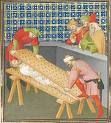

-250 Roman consuls: Lucius Manlius Vulso and Gaius Atilius Regulus. About this year the Roman Warm Period (Climatic Optimum) in Europe and North Am. begins (ends 400 C.E.), causing Theophrastus to write that date trees can grow in Greece but can't set fruit, as in modern times; the mild weather conditions help Hannibal cross the Alps with his elephants. The Carthaginians sue Rome for peace, dragging Regulus along with them; after he puts on a heroic show to dissuade them from ransoming him, he is returned to Carthage and put to death in a spiked barrel; the Romans seize Lilybaeum (Marsala), the Carthaginian naval base at the W tip of Sicily. Ptolemy II recovers the Cyclades. About this time Agron (d. -231) establishes the first Kingdom of Illyria (Albania) (Bosnia), building a modest stone city. Bactrian satrap Diodotus I (d. -210) declares himself independent, and conquers Sogdiana, founding his own dynasty. About this time Greek academic skeptic philosopher Arcesilaus (-316 to -240) founds the Second (Middle) Academy in Athens. About this time Paris in Gaul is founded as Lutetia by the Celtic Parisii in the Ile de la Cite (Île de la Cité), the island in the middle of the Seine River, with the Pont Neuf ("new bridge") spanning the Seine River at the downstream (W) point. About this time the port of Shanghai ("upon the sea") (modern-day pop. 24M/34M) in the Yangtze River Delta in C China on the East China coast is greatly improved by the excavation of the Huangpu (Chunshen) River on the orders of Lord Chunshen (d. -238), PM of the Kingdom of Chu during the Warring States Period of China, causing Shanghai to be nicknamed Shencheng ("City of Shen"). By this time there is a large Jewish community in Ephesus, according to Josephus (Ant. 12.125-6, 166-8, 172-3). By this time wheat (triticum) (bread) displaces emmer (far) (porridge) as the staple of the Roman diet, although Greeks continue to call Romans "porridge eaters". About this time the La Tene (Tène) Iron Age Celtics invade Britain, and their culture gains predominance, making excellent swords and helmets, jewelry, horse harnesses, and pottery. Architecture: About this time Indian emperor Asoka begins the 40-50 ft.-high Columns (Pillars) of Asoka dedicated to Buddha containing his edicts, incl. at his alleged birthplace in Lumbini, Nepal, exempting the region from taxes; one edict orders hospitals to be built along the routes of travelers, and that they be "well provided with instruments and medicine, consisting of mineral and vegetable drugs, with roots and fruits"; "Whenever there is no provision of drugs, medical roots, and herbs, they are to be supplied, and skilful physicians appointed at the expense of the state to administer them"; too bad, when Buddhism falls ca. 750 C.E., the system of public hospitals and medical schools become kaput. Science: About this time the principles of the lever, compound pulley, and other simple machines are developed by Archimedes. Deaths: Greek historian Timaeus (b. -345) in Sicily; leaves his 40-vol. Histories, covering Greek history to the First Punic War, becoming one of the first Greek works to recognize the importance of Rome, covering the history of Italy and Sicily, using Olympic years and winners of the Stadion, Athenion Archons, Spartan Ephors et al. to compute his chronologies. Greek physician Erasistratus (b. -304) in Asia Minor; buried near Mount Mycale in Ionia.
-249 Peloponnesian gov. Alexander of Corinth (d. -245) revolts from Antigonus II, and holds the peninsula until his death in -245. The naval Battle of Drepanum is a V for Carthage against Rome, which loses 180 of 210 ships, and builds a 3rd fleet of 120 battleships and 800 transports, which they lose partly in battle and partly in a storm. Zhuang Xiang Wang becomes king of the Qin (Ch'in) in China, and brings an end to the Lu Dynasty. Roman consuls: Marcus Claudius Glicia (dictator) and Aulus Atillus Calatinus (dictator) and Publius Claudius Pulcher and Lucius Junius Pullus.

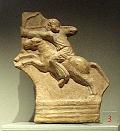
-248 The 133rd Olympiad. Arsaces I (d. -211), new leader of the Parni tribe in E Iran begins a war to oust the Syrians under Antiochus II, defeating and killing Seleucid satrap Andragoras in -238 and capturing Astabene (Astauene); next year he founds the Zoroastrian Parthian (Arsacid) Empire (ends 224 C.E.), SE of the Caspian Sea in modern-day Afghanistan and NE Iran between the Seleucid Kingdom in the W and the Bactrian Kingdom in the E; they inherit a mix of Greek and Persian culture, and become known for their multicultural tolerance; Parthian soldiers are given seven years of physical training then awarded a special belt, and like to wear mustachios; their horse archers become known for their trick of pretending to flee then shooting arrows back at the enemy when their guard is down, AKA the Parthian Shot (parting shot). Ptolemy II recovers Cyrene, independent since -274. Roman consuls: Publius Servilius Geminus and Gaius Aurelius Cotta.

-247 The Achaean League drives the Macedonians from Corinth. Hamilcar ("brother of Melqart") Barca ("lightning") (-275 to -228) is appointed CIC of Carthaginian forces in Sicily, sending naval forces to ravage the coastline of Lucania and Bruttium before establishing himself on 1,970-ft. Mt. Eercte (Hercte) (Mount Pellegino) (W of Panormus) in N Sicily (most beautiful promontory in the world, according to Goethe) (until -244), fortifying his camp, building a harbor for his fleet, and continuing raids on the Italian coast as far N as Cumae. Iranian nobleman Andragoras (Narisanka) (d. -238), Seleucid satrap of Parthia (W Khurasan) revolts against the Seleucids, giving Arsaces his big chance. Roman consuls: Numerius Fabius Buteo and Lucius Caecilius Metellus. Births: Carthaginian Rome-hating gen. Hannibal Barca ("lightning") (d. -182); son of Hamilcar Barca (-270 to -228).
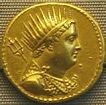

-246 On Jan. 29 Ptolemy II (b. -285) dies, and his son (who as crown prince has already put down a revolt in Cyrenaica) Ptolemy III Euergetes ("benefactor") I (d. -222) becomes king #3 of Egypt's 32nd (Ptolemaic) Dynasty, and soon receives an urgent call for help from his sister (Antiochus II's 2nd wife) Berenice II, who is under siege by Laodice I, beginning the Third Syrian (Laodicean) War (War of Berenice) between Ptolemy III and Seleucus II (ends -241); Berenice II and her infant son are murdered in Antioch before Ptolemy III arrives in Asia Minor, taking Antioch, then moving E to take Babylon and Seleucia-on-the-Tigris; Antiochus II Theos is poisoned by his first (divorced) wife Laodice I in Asia Minor, and her son Seleucus II Callinicus ("gloriously victorious") (-265 to -226) becomes Seleucid king of Syria (to -226). Antigonus II Gonatas of Macedonia reconquers the Cyclades from Ptolemy III Euergetes of Egypt in the naval Battle of Andros. 13-y.-o. Ying Zheng (-259 to -210) becomes emperor of Qin (Ch'in) in China (until -210) under regent Lu Buwei (until -237). Roman consuls: Titus Coruncanius (dictator) and Marcus Fabius Licinius and Manius Otacilius Crassus. Inventions: Ctesibus of Alexandria invents the hydraulis (water organ), a mechanical flute-playing instrument whose wind pressure is regulated by water pressure, becoming the first organ, and him the first organist; it takes until the 6th-7th cent. for bellows to be invented. Births: Egyptian queen (-220 to -204) Arsinoe III Philopator ("father-loving") (d. -204); wife of Ptolemy IV; mother of Ptolemy V Epiphanes. Deaths: Greek Seleucid king (-261 to -246) Antiochus II Theos (b. -286) in Asia Minor (poisoned by Laodice I).
-245 Roman consuls: Marcus Fabius Buteo and Gaius Atilius Bulbus. Eudamidas II dies, and his reformer son Agis IV (-265 to -241) becomes Eurypontid king #25 of Sparta (until -241), becoming known as idealistic but impractical.
-244 The 134th Olympiad. Hamilcar Barca is dislodged from Mount Ercte, and captures the city of Eryx at the base of 750m Mount Eryx (Erice) (modern-day Monte San Giuliano) in W Sicily, trapping the Romans guarding the Temple of Venus at the top while sending his army to siege Drepanum and raiding the coasts of Sicily and Italy with his fleet (until -241). Roman consuls: Aulus Manlius Torquatus and Gaius Sempronius Blaesus.

-243 The Achaean League takes Corinth from Macedonia. King Leonidas II of Sparta goes into exile until -241; his son-in-law Cleombrotus II rules during his absence. Roman consuls: Gaius Sulpicius Gallus and Gaius Fundanius Fundulus.
-242 A praetor peregrinus is appointed to assist the praetor urbanus in lawsuits in which one or both of the litigants are foreigners. Roman consuls: Aulus Postumius Albinus and Quintus Lutatius Catulus.

-241 On Mar. 10 after the exhausted Romans manage to launch a 4th fleet of 200 ships under Gaius Lutatius Catulus, they win the naval Battle of the Aegates (Egadi) Islandsagainst exhausted Carthage under Adm. Hanno off the Aegates Islands W of Sicily, cutting off their African supply bases and winning Sicily, forcing Hamilcar to abandon it; Carthage is doomed. The Third Syrian War (begun -246) ends after a number of low Nile floods cause a famine in Egypt, and Ptolemy III sues Seleucus II for peace; Seleucus II surrenders the coasts of Syria and S Asia Minor, along with some Aegean ports; Seleucus II recognizes his brother Antiochus Hierax (Gr. "falcon") (d. -226) as ruler of Asia Minor. Eumenes I dies, and cousin's son Attalus (Attalos) I Soter (Gr. "savior") (-269 to -197) comes to power in the city of Pergamon in NW Turkey, and defends the city from the dying, er, invading Gauls, taking the title of "savior". Agis IV is executed for attempting agrarian reform (dividing the land into 4.5K equal lots rather than giving it only to the 700 it had fallen to) and trying to introduce the Lycurgan constitution, and his infant son Eudamidas III (-240 to -228) becomes Eurypontid king of Sparta (until -228), with regents ruling in his place. Architecture: The Aurelian Road (Via Aurelia) between Rome and Alsium, then along the SW coast of Italy as far as Cosa is begun; it is eventually extended into Arles in Gaul. Roman consuls: Quintus Lutatius Cerco and Aulus Manlius Torquatus.

-240 The 135th Olympiad. Halley's Comet can be traced back to this year (76-year cycle); it tends to appear four years before a war breaks out? Seleucus II attacks his brother Antiochus Hierax, and the latter secures the aid of Mithridates II of Pontus and the Celtic Galatians; the Galatians crush Seleucus at Ancyra. Sweet dreams are made of these? Carthaginian gen. Hamilcar Barca signs a treaty with Roman Gen. Gaius Lutatius Catulus, ending the First Punic "offensive-defensive" War (begun -264); Sicily (except for Syracuse and one-quarter of Sicily, which are controlled by Hiero II) becomes an "estate" of the Roman people, paying tribute and yielding profit to the victors; Carthage pays a war indemnity of 3.2K talents; there is peace between R and C for 22 years after this war in which both really lose?; but never fear, because after Hamilcar, suffering from lack of support by his govt. reneges on promised pay to some of his African tribal mercenaries from Sicily, they mutiny and begin looting, forcing farmers to quit cultivating the land; after Carthaginian politician Hanno the Great fails to appease them, he summons Hamilcar, who ruthlessly kicks their butts on the Bagrades River (modern-day Medjerda) and relieves the siege of Utica, only to be sieged by the mercenaries under Spendius, defeating them again with help from Numidian chief Naravas, killing 10K and taking 4K POWs, enrolling them in his army or releasing them until he learns that they have been mutilating Carthaginian POWs, then crucifying them by the thousands and capturing their towns. You just know that the Romans stole their higher culture from Greece, but can't pin it down to a year? The Anteclassical Period of Latin (ends -80), known for the writings of Ennius, Plautus, and Terence begins when Lucius Livius Andronicus (-284 to -204), a Greek freedman who had been captured at Tarentum in -272 becomes the first Greek teacher in Rome, adapting Greek comedies and tragedies for performance in Latin, founding Latin lit.; he also translates Homer's "Odyssey" into Latin, giving Romans their first poetry other than hymns and drinking songs? Roman consuls: Gaius Claudius Centho and Marcus Sempronius Tuditanus.


-239 The leap year is introduced into the Egyptian calendar. Antigonus II Gonatas dies, and in the winter his son Demetrius II (d. -229) becomes king of Macedonia (until -229); after he protects Epirus against the Aetolian League, it breaks with Macedonia and allies with the Achaean League. Diodotus I of Bactria allies with Seleucus II against the Parthians and is killed, and his son Diodotus II (d. -230) becomes king of Bactria (until -230). After Hanno quarrels openly with Hamilcar, the latter is promoted to CIC of the Carthaginian army, defeating an army of mercenaries sieging Carthage by driving them into a defile and massacring them, then reconciling with Hanno under pressure of the senate and sieging Tunis, defeating their leader Matho and reducing Utica; Hamicar forms a plan to conquer and found a new empire in Spain to use as a base for a final assault on Rome (begins -237). Roman consuls: Quintus Valerius Falto and Gaius Mamilius Turrinus. Births: Roman poet ("Father of Roman Poetry") Quintus Ennius (d. -170) in Rudiae, Salento; hometown fuses Greek, Latin, and Oscan tongues - Five Ns?

-238 After it revolts, a Roman fleet under plebeian consul Tiberius Sempronius Gracchus Major (the Elder) (first of the gens Sempronia to become consul) lays seige to the Carthaginian province of Sardinia (135 mi. W of the mouth of the Tiber River) and annexes it; he also scores a V over the Ligurians in NW Italy; in spring after receiving support from the senate to make up for the loss of Sicily and Sardinia, Carthaginian gen. Hamilcar Barca goes to Spain with his 9-y.-o. son Hannibal after making him swear eternal enmity against Rome, using the Phoenician colony of Gades as base to take on the Tartessians, Celts, and Iberians in S and W Spain. Demetrius II of Macedonia attacks Aetolia, beginning the War of Demetrius (ends -229). Attalus I begins a war against Hierax and the Galatians (ends -227). Seleucus II expels Arsaces I from Parthia, but withdraws to deal with a revolt in Syria, allowing him to return. A great assembly of priests is held in Canopus, Egypt, leaving the Table of Canopus (Canopus Stone) (Decree of Canopus), which serves as a double-check on the trans. of the Rosetta Stone; discovered in 1866 by Prussian Egyptologist Karl Richard Lepsius. Roman consuls: Publius Valerius Falto and Tiberius Sempronius Gracchus. Births: Macedonian king (-221 to -179) Philip V (d. -179); son of Demetrius II; adopted by his father's cousin Antigonus III Doson. E Numidian (Massylian) king #1 Masinissa (Massinissa) (Massena) (Masensen) (d. -149); Roman ally against Hannibal; husband of Sophonisba, ex-wife of Syphax, and daughter of Hasdrubal.
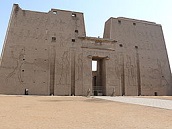
-237 Ying Zheng throws off his regent-PM Lu Buwei and rules by himself (until -210), going on to subjugate all the rival states (Han, Zhao, Wei, Chu, Yan, Qi) and create the first centralized feudal empire in Chinese history, becoming the first real Chinese emperor. Roman consuls: Lucius Cornelius Lentulus Caudinus and Quintus Fulvius Flaccus (2nd time). Architecture: On Aug. 23 the Egyptian Temple of Horus at Edfu on the W bank of the Nile River in Upper Egypt is begun (finished -57).
-236 The 136th Olympiad. Roman consuls: Publius Cornelius Lentulus Caudinus and Gaius Licinius Varus. Births: Roman gen. Publius Cornelius Scipio Major (the Elder) Africanus (d. -183); grandfather (by adoption) of Scipio the Younger (-185 to -129); called Africanus after defeating Hannibal at Zama (-202) in the Second Punic War. Deaths; Chinese philosopher Han Fei Zi (b. 280) in Qin (suicide by poison); leaves Han Feizi, becoming a std. work on Chinese legalism; the Period of One Hundred Schools in China (classical Chinese philosophy) ends.
-235 The doors of the Temple of Janus Geminus in Roman Forum are closed for the first time, indicating that Rome is at peace; next time -30. King Leonidas II of Sparta dies, and reformer Cleomenes III (-260 to -219) becomes Agiad king of Sparta (until -222) after marrying the widow of Agis IV, going on to imitate Agis II and become Sparta's most energetic king, trying to restore the prestige while waging wa against the Achaean League under Aratus of Sicyon. Roman consuls: Titus Manlius Torquatus and Gaius Atilius Bulbus.
-234 The first elementary school opens in Rome. Roman consuls: Lucius Postumius Albinus and Spurius Carvilius Maximus. Births: Roman "novus homo" statesman-historian (redhead) (grey eyes) Marcus Porcius Cato (Lat. "All-Knowing") Priscus (Lat. "the Ancient") Censorius (Lat. "the Censor") Major (Lat. "the Elder") (d. -149) in Tusculum; first Roman to write a history in Latin; gives several speeches all ending with the phrase "Delenda est Carthago" ("Carthago delenda est") (Carthage must be destroyed).
-233 Macedonia is attacked by invaders from the N, causing Demetrius II to break off his attack on Aetolia. Nothatus the Tyrant (d. -213) becomes king of the Picts (Scotland). Roman consuls: Quintus Fabius Maximus Verrucosus and Manius Pomponius Matho. Deaths:

-232 The 137th Olympiad. After the Celtic Galatians in Asia Minor side with renegade Seleucid prince Antiochus Hierax, and the Hellenized cities unite behind him and inflict several defeats on them, they are forced to settle permanently in modern-day Galatia, with the Tolistobogii in the W around their capital Pessinus, the Tectosages in the C around their capital Ancyra, and the Trocmi in the E around their capital Tavium. Agron dies, and the Illyrian Ardiaei throne is occupied by his wife Queen Teuta (Tefta) (d. -227), the "Catherine the Great of Illyria", acting as regent for her son Pinneus; she drives the Greeks off the Albanian coast, then considers piracy as a lawful trade and begins attacking Roman ships in the Ionian Sea. Ashoka the Great (b. ?) dies, and his Mauryan Empire in India begins breaking up into smaller kingdoms, incl. the Andhra (Satavahana) Dynasty in S India in modern-day Andra Pradesh (ends 230 C.E.). Deaths: Indian Buddhist king Asoka (Ashoka) (Sans. "without sorrow") Maurya the Great (b. ?); son of Bindusara Maurya (-297 to -273). Greek Stoic philosopher Cleanthes (b. -331).
-231 Epirus joins the Aetolian and Achaean Leagues against Demetrius II of Macedonia. Roman consuls: Gaius Duilius (dictator) and Gaius Papirius Maso and Marcus Pomponius Matho.
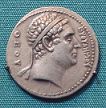
-230 Attalus I crushes the Galatians near Pergamon, taking the title of king. The Dardanians defeat Demetrius II. Diodotus II is killed by usurper Euthydemus I (-260 to -200), satrap of Sogdiana, who becomes king of Bactria (until -200). A new invasion force of Gauls crosses the Alps into Italy, ending the longtime peace between the tribes of Cisalpine Gaul (Po Valley) and Rome, causing the Boii to personally repel them, after which an arriving Roman army turns back. The state of Han is conquered by Ch'in soldiers under King Cheng, becoming the first of six states to fall. About this time oil lamps begin to be used in Greece. Roman consuls: Marcus Aemilius Barbula and Marcus Junius Pera. Births: Greek philosopher Diogenes the Stoic (Diogenes the Babylon) (d. -150) in Seleucia; teacher of Carneades the Academic (-213 to -129). Deaths: Greek skeptic philosopher Timon of Phlius (b. -320). Greek astronomer Aristarchus of Samos (b. -310).
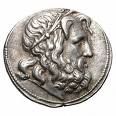
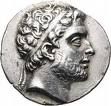
-229 Demetrius II Aetolicus dies, and his Antigonid cousin Antigonus (Antigonos) III Doson (Gr. "going to give", "always promising") (-263 to -221) becomes guardian of Demetrius' 8-y.-o. son Philip V (Demetrius III) (-238 to -179), going on to marry his mother and become king of Macedon (until -179); the War of Demetrius (begun -238) ends; Argos expels pro-Macedonian tyrant Aristomachus and joins the Achaean League; Athens declares independence from Macedonia. War breaks out between Sparta and Achaea. Attalus I of Pergamum drives Antiochus Hierax out of Asia Minor (ends -228). Eurycleides and Mikion are elected rulers of Athens. The Romans declare war on Queen Teuta of Illyrium, and a huge army and navy under the command of Santumalus and Alvinus attacks Albania (Dalmatia), capturing the coastal city of Epidamnos, whose name the Romans don't like because of associations with the Latin word "damnum", causing them to rename it Dyrrachium (Lat. "bad spine", "difficult ridge") for its high cliffs (really named after its founder?); it becomes the landing spot for Romans crossing the Ionian Sea from Brundisium, and the start of the Via Egnatia military road to Thessalonica. Roman consuls: Lucius Postumius Albinus and Gnaeus Fulvius Centumalus.
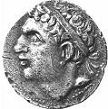
-228 The 138th Olympiad. Hamilcar Barca (b. -275) is KIA in Spain in battle against the Vettones (drowns on the back of an elephant?), and his 2nd son Hasdrubal Barca ("lightning") (-245 to -207) (Hannibal's brother) takes command of the Carthaginian army in Spain, and finishes conquering it, founding the city of Carthago Nova (New Carthage) (Nova Cartagena), located on a peninsula with two excellent harbors and a nearby silver mine; the Romans forbid them to cross the Ebro River. Dalmatia comes under Roman domination. Seleucus II Calinicus gathers an army in Babylonia to recapture Parthia. Cleomenes III defeats the Achaean League under Aratus of Sicyon, then seizes power in Sparta, redivides the land, enfranchises 4K perioikoi, and abolishes the ephorate, forming a larger citizen army. Eudamidas III dies, and Archidamus V (d. -227) becomes Eurypontid king #27 of Sparta. Ziaelas is killed by some Galatian Gauls, and his son Prusias I Chlorus (-228 to -182) becomes king #4 of Bithynia, going on to form a marriage alliance with Philip V of Macedon. The first Roman ambassadors are sent to Athens and Corinth - how long till they sack it? Roman consuls: Quintus Fabius Maximus Verrucosus and Spurius Carvilius Maximus. Births: Roman Gen. Titus Quinctius Flaminius (d. -174); brother of Lucius quinctius Flaminius (d. -170). Deaths: Carthaginian gen. Hamilcar Barca (b. -275) (KIA); dies after allegedly founding the port of Barcelona (originally Barcino) in Spain in 218 B.C.E. (modern-day pop. 1.6M/5.3M).
-227 Archidamus V is deposed by Cleomenes III, who poisons Eurydamidas and installs his Agiad brother Eucleidas (d. -222) becomes Eurypontid king of Sparta (until -222); Cleomenes III of Sparta starts a war with the Achaean League. Arsaces I returns victorious to Parthia after Seleucus II withdraws. Antigonus III Doson takes the throne of Macedonia from Demetrius III (Philip), then makes peace with Aetolia and drives the northern tribes out of Macedonia. Seleucus drives Antiochus Hierax out of Syria to Celt-run Thrace, where he is killed next year. Teuta accepts a peace with Rome, and abdicates and/or dies. Roman consuls: Publius Valerius Flaccus and Marcus Atilius Regulus.

-226 Seleucus II dies, and his son Seleucus III Soter Keraunus (Ceraunus) ("thunderbolt") Soter (Gr. "savior") (-241 to -223) becomes king of Syria (until -223). The 226 B.C.E. Rhodes Earthquake destroys the Colossus of Rhodes, causing it to snap at the knees and fall over onto the land; it also destroys the city of Camirus along with its temple; Ptolemy III offers to pay for the reconstruction of the Colossus of Rhodes until the Oracle of Delphi nixes it; the ruins lay around for the next eight cents. (until 654 C.E.), becoming a tourist attraction, with people wrapping their arms around the fallen thumb for a photo opp. Roman consuls: Marcus Valerius Messala and Lucius Apustius Fullo.
-225 Roman consuls: Lucius Aemilius Papus and Gaius Atilius Regulus. Roman pop.: 5M, incl. 3M-3.5M free, 1.2M-1.7M slaves, and 280K Roman citizens; by 14 C.E. the pop. of Italy increases by 50%, mostly slaves. The Romans decide to partition the Gallic territory of Picenum in the Italian Marche, pissing-off the neighboring Boii and Insubres of Cisalpine Gaul, who hire the Gaesatae (Gael. "spearmen"), a group of naked dangly Gaulish mercenaries living in the Alps near the Rhone River, led by Concolitanus and Aneroestes (Aneroëstes) (d. -225) to help them fight the Romans, the news causing the Romans to make a treaty with Carthaginian gen. Hasdrubal giving him control of Spain to free them to take on the pesky Gauls, with consuls Gaius Atilius Regulus (d. -225) and Lucius Aemilius Papus forming armies, with Papus stationing four legions of Romans (22K men) plus 32K allies in Ariminum, stationing another 54K Sabines and Etruscans under command of a praetor on the Etruscan border, and sending 20K Umbrians and Sarsinates and 20K Veneti and Cenomani to attack the home territory of the Boii, threatening the Insubrian frontier, while Regulus ships off from Sardinia with 50K men and calls on 21.5K Romans and 32K allies in Rome, plus reserve legions in Sicily and Tarentum; meanwhile after 70K madass mainly naked and dangly Celts (incl. 30K Gaesatae) overrun Etruria and march toward Rome (the last serious invasion of Italy by the Gauls), the Romans meet up with them at Clusium (three days march from Rome), causing both sides to set up camps; the 50K-man Gallic infantry then leaves their 20K-man cavalry behind at night with campfires burning while they sneak off to the Etruscan town of Faesulae (modern-day Fiesole) 3 mi. NE of Florence (modern-day Fiesole) and entrench themselves with new fortifications, after which the next morning the cavalry parades out, causing the Romans under Papus to believe they're retreating and follow them to the trap, where 6K are KIA; after the Gauls make the mistake of veering to the coast to make off with their booty, the Romans under Regulus cut them off at Telamon in Etruria (modern-day Talamone in Tuscany), causing the Battle of Telamon (last use of the war chariot in continental Europe), starting with a hill battle that results in Regulus being KIA, and his head taken for a new drinking cup, pissing-off the remaining 75K Romans (incl. 5K cavalry) under Papus, who defeat them after the small er, shields of the Gaesatae in the front prove no match for Roman javelins, causing them to retreat, after which their allies are slaughtered, with 40K casualties and 10K taken POW, incl. Concolitanus; Aneroestes escapes and commits suicide; the Romans engage in human sacrifice before the battle in order to examine the quivering livers of the victims for signs and portents; Papus then goes on a punitive expedition, destroying all Celtic tribes S of the Po River, after which he receives a triumph in Rome - you won't have my mataris to kick around anymore? Cleomenes III of Sparta bests Aratus of Sicyon, causing him to appeal to Antigonus III for help. The Chinese state of Qin (Ch'in) conquers the Chinese state of Wei (founded -403). Lyco (b. -299) dies, and his student Aristo of Ceos (d. -190) succeeds him as dir. #5 of the Lyceum in Athens, leaving Conversations in Love, and a bio. of his master Lyco. About this time Roman historian ("Father of Roman History") Quintus Fabius Pictor writes a Roman History (in Greek), covering from Anaeas to the Second Punic War; the first Roman historian writes in Greek? Deaths: Greek Peripatetic philosopher Lyco (b. -299).
-224 The 139th Olympiad. Syria and Pergamon start a war (ends -221). The Achaean League requests Macedonian aid against Sparta and the Aetolian League. Roman consuls: Lucius Caecilius Metellus (dictator) and Titus Manlius Torquatus and Quintus Fulvius Flaccus (3rd time).

-223 After Seleucus III is murdered during his war with Attalus I of Pergamum, his younger brother Antiochus III (the Great) (-243 to -187) becomes king of Syria (until -187). Archimedes is accused of impiety. Ch'in conquers the state of Chu (Ch'u) (founded -1030). Roman consuls: Publius Furius Philus and Gaius Flaminius.
-222 The Romans conquer N Italy from the Celts, incl. Novara in the Piedmont, and the ancient Celtic town of Mediolanum (modern-day Milan) (Lat. "medio" + "planum" = center of the plain) in the Po River Valley of the 400-mi. Po (Padus) River (longest river in Italy, with source on 12.6K-ft. Mount Viso in the Cottian Alps), which is as little as 1 ft. deep in some places - it's called the Po River because it's a po' excuse for a river? Megalopolis is destroyed by Cleomenes III of Sparta, but is later restated by Achean League leader Philopoemen; a new Hellenic League, consisting of the Achaean League allied with Antigonus III Doson of Macedonia routs the Spartan army in the Battle of Sellasia, and takes possession of Sparta, making it kaput as a political entity; Cleomenes III flees to Egypt to the protection of his patron Ptolemy III; Antigonus abolishes the Spartan kingship, restores the ephors, and forces Sparta to join his league. The election of Roman consuls is moved to the Ides of March (Mar. 15). Ch'in conquers the state of Yan (founded in 11th cent. B.C.E.). Roman consuls: Gnaeus Cornelius Scipio Calvus and Marcus Claudius Marcellus. Deaths: Greek writer Philo of Byzantium (b. -280); leaves Pneumatics, which incl. the first description of a water mill and the problem of doubling the cube. Spartan king Eucleidas (b. ?).

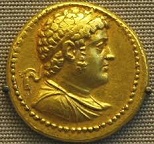
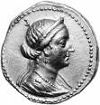
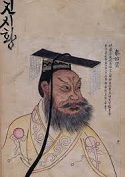
-221 Roman consuls: Quintius Fabius Maximus Verrucosus (dictator) and Publius Cornelius Scipio Asina and Marcus Minucius Rufus. Antigonus III Doson dies, and his adopted son Philip V (-238 to -179) becomes king of Macedonia (until -179), going on to attempt to maintain Macedonian hegemony over the Greek city-states but ultimately blundering them into Roman domination. Ptolemy III Euergetes dies, and his fat lazy son Ptolemy IV Philopator ("father loving") (d. -204) becomes king #4 of Egypt's 32nd (Ptolemaic) Dynasty, imprisoning Cleomenes III; the Eyptian Ptolemaic Dynasty peaks and goes down under this weak king dominated by his chief minister Sosibius, who has his mother, uncle, and younger brother killed while he becomes addicted to orgiastic practices of religion and lit. dilettantism, building a temple to Homer and marrying his sister Arsinoe III Philopator (-246 to -204) while being pussy-whipped by his mistress Agathoclea (-247 to -202), sister of his minister Agathocles (-202). The war between Syria and Pergamon (begun -224) ends with Syria recovering most of the territory lost since -241; the Fourth Syrian War (ends -217) begins between Antiochus III and Ptolemy IV. Hasdrubal (b. -245) is assassinated, and the army chooses his 26-y.-o. lt. and brother-in-law Hannibal as CIC of the Carthaginian army, giving him the tools to implement his desire of revenge against the *!?!* Romans; first he has to finish subjugating Spain, which takes two years. Pretender brothers Molon and Alexander unsuccessfully revolt from Syria in Mesopotamia (ends -220). Ying Zheng conquers the last pesky state of Ch'i (Qi), proclaiming himself emperor Qin Shi Huang Di (Shih Huang-ti) (Shih Hwang-ti) (-259 to -210) of the new think-happy-thoughts Qin (Ch'in) Dynasty (ends -206), ending the Warring States Period in China (begun in -401); all weights and measures are unified; from now until ? China lives in splended isolation, surrounded by sea, malarial jungles, deserts, and mountains, with no agrarian city-possessing neighbor to compete with it. Architecture: The Circus Flaminius is built for the plebeian games by popular leader Gaius Flaminius Nepos - catch Uncle Nasty's show? Science: The heart valves are named by ?.

-220 The 140th Olympiad. Roman consuls: Marcus Valerius Laevinus and Quintus Mucius Scaevola. Hannibal assisted by 40 elephants captures the city of Helmantica (modern-day Salamanca) (pop. 5K) in NW Spain on the Tormes River (120 mi. W of modern-day Madrid) from the Celtic tribe of the Vettones. Antiochus III suppresses Molon and Alexander in Mesopotamia. Spartan king Cleomenes III escapes, then tries to stir up a revolt in Alexandria. Philip V of Macedonia wars against the Aetolian League (until -217). Prusias I Chlorus of Bithynia wars against Byzantium, and defeats the Gauls. Philip V of Macedonia assembles the Hellenic League in Corinth and declares the Social War (ends -217) against the Aetolians, Elis and Sparta, engineered by Aratus of Sicyon. Ariarathes III dies, and his boy son Ariarathes IV Eusebes (the Pious) (d. -163) becomes king of Cappadocia, going on to marry Antiochis, daughter of Antiochus III the Great of Syria and his wife Leodice III, and produce daughter Stratonice (Stratonike), who goes on to marry Eumenes II of Pergamum. Architecture: The Milvian Bridge in Rome is built. The Flaminian Road (Way) (Via Flaminia) from Rome N to Rimini is built about this time. Art: The flaccid, er, reclining Statue of the Dying Gaul is erected by Attalus I in Pergamon about this year to commemorate the big V against them in -241. Births: Roman tragic poet-dramatist-painter Marcus Pacuvius (d. -130); nephew of Ennius. Roman comic poet Caecilius Statius (d. -166).
-219 Hannibal subjugates all Spain between the Tagus and Ebro (Iberus) Rivers, except for the pesky walled Greek colony of Saguntum (Sagunto) in E Spain (18 mi. N of Valencia) S of the Ebro River in the middle of his holdings, which had a "friendship" with Rome and used it to play politics with other Spanish cities, causing him to siege it for 8 mo. before taking it, during which he is severely wounded; using this as an excuse, the Romans eagerly void their agreement with Carthage not to interfere with affairs S of the Ebro River and demand that Hannibal be handed over; when they refuse, the Second Punic War (ends -201) between Rome and Carthage begins; Hannibal recruits Celtic tribesmen from Lacobriga (modern-day Lagos) and other towns in Spain and the Algarve to fight the Romans. Exiled Spartan Agiad king Cleomenes III (b. -260) is slain in Egypt, and an anti-Macedonian faction in Sparta restores the dual kingship; he is succeeded by Agesipolis III (d. -215), grandson of Cleombrotus II as Agid king #31 (last) of Sparta, and Lycurgus (d. -210) becomes Eurypontid king of Sparta. Emperor Shi Huang Di orders Xu Fudong to find the fountain of youth, and he asks for thousands of children and sails eastward; the Chinese believe he lands in Japan and populates the island.

-218 Roman consuls: Publius Cornelius Scipio the Elder and Tiberius Sempronius Longus. Rome elects Publius Cornelius Scipio the Elder (Major) (-236 to -183) as consul to fight the Carthaginians; in the summer Hannibal leaves New Carthage, Spain with an army of 90K foot, 12K cavalry, 15K-20K horses, and a herd of elephants, crosses the Ebro River and the Pyrenees, builds rafts to cross the Rhone River, then crosses the Cottian Alps into Italy over Col de la Traversette SW of Turin in 15 days, fighting snowstorms, landlsides, and hostile mountain tribes, losing thousands of men (all but 26K?) and all but 37 of his elephants, saving his favorite 1-tusked elephant Surus ("the Syrian) (the Syrian), winning a battle against the Ligurians and recruiting new soldiers 'among the friendly Insubres in return for subjugating their enemies the Taurini (in modern-day Turin); he then forces all the Celtic (Cenomani et al.) and Ligurian tribes into his alliance on the Upper Po (Padus) River, reaching 80K foot and 10K cavalry; meanwhile the Boii revolt and siege Mutina (Modena), and all of Gallia Cisalpine turns against the Romans; Scipio the Elder attempts to intercept him, arriving by sea at Marseille three days late, and Hannibal defeats him in two engagements in Nov. at the Battle of the Ticinus River near its confluence with the Po River (near Ticinum AKA Pavia), becoming the first battle of the war on Italian soil and the first battle to employ legion-sized forces; in Dec. (winter solstice) the Battle of the Trebbia (Trebia) River near its confluence with the Po River is a V for Hannibal and his 20K infantry and 10K cavalry over 18K Roman infantry and 20K Italian allies incl. 4K cavalry under consul Tiberius Sempronius Longus (-260 to -210), who is walked into a trap and loses 26K-28K casualties; Scipio then makes the strategic decision to invade Spain and destroy Hannibal's supplies and reinforcements, leaving Hannibal "in the air", able to defeat any Roman army in Italy but unable to conduct sieges or shore up his conquests - like a pinball in a pinball machine? Roman legions begin settling along the de-Celted lower Po River, founding the twin military outposts of Cremona and Placentia (modern-day Piacenza). 420 mi. SE of Milan near the confluence of the Po and Trebia Rivers on the Lombard plain. Roman consuls: Lucius Aemilius Paullus and Marcus Livius Salinator.


-217 On June 22 after initial setbacks in the war, losing much of the Syrian coast, Ptolemy IV of Egypt scores an underdog V against Antiochus III at the Battle of Raphia (Gaza) near Gaza by using some native Egyptian troops, becoming the first known battle between Asian and African elephants, Ptolemy's 73 African elephants vs. Antiochus' 102 Asian elephants; "A few of Ptolemy's elephants ventured too close with those of the enemy, and now the men in the towers on the back of these beasts made a gallant fight of it, striking with their pikes at close quarters and wounding each other, while the elephants themselves fought still better, putting forth their whole strength and meeting forehead to forehead. Ptolemy's elephants, however, declined the combat, as is the habit of African elephants; for unable to stand the smell and the trumpeting of the [Asian] elephants, and terrified, I suppose, also by their great size and strength, they at once turn tail and take to flight before they get near them" (Polybius); Ptolemy used forest elephants, while Antiochus used savannah elephants?; the Syrians lose 10K KIA incl. 300 horse and 5 elephants, and 4K taken POW vs. 1.5K KIA, 700 horse and 16 elephants for the Egyptians, who capture most of the Syrian elephants; the Fourth Syrian War (begun -221) ends with Antiochus retaining only the port of Seleucia on the Syrian coast, but the win boomerangs when it causes a nationalistic awakening in Greek-ruled Egypt?; the battle plus a visit by Ptolemy to Jerusalem are mentioned in 3 Macc. 1. On June 24 after a forced march S through a swamp in Eturia (Tuscany), where he gets an infection that blinds his right eye, Hannibal passes through Fiesole in Tuscany and ambushes and completely destroys a Roman army under Roman consul Gaius Flaminius at the Battle of Lake Trasimenus (Trasimeno), then crosses the Apennines and invades the province of Picenum (on the E coast) (incl. Ancona and capital Asculum Picenum or Ascoli Piceno), followed by Apulia, then recrosses and ravages Campania on the shin, unsuccessfully attempting to seize the seaside resort city of Cumae W of Neapolis (Naples) (where Capuan gov. Virrius tells him the story of Daedalus and Icarus), and the double-walled Umbrian city of Todi in C Italy; the freaked Romans name Quintus Fabius Maximus Verrucosus (the Cunctator or Delayer) (-275 to -203) as the new dictator of Rome, and he decides to fight Hannibal by delaying tactics rather than a head-on fight against those heavy elephants and their big balls, er, soldiers, to give his troops time to recuperate; Hannibal outwits Cunctator on his way back to Apulia, whose pop. are unfriendly to the Romans, then winters at Gerontium; "Unus homo nobis cunctando restituit rem" (One man by delaying tactics restored our republic); meanwhile the Cuntator attacks Arpi (Argyrippa) (Argos Hippium) in Apulia, capturing it in -213; UFOs are sighted in Arpi in the form of parmas (small round metal shields) in the sky. The Social War between Macedonia and the Aetolian League (begun -219) ends with the Peace of Naupactus, allowing Macedonia to secure Illyria against the Romans. The first paid soldiers appear in Rome when troops are needed to be trained for invading Spain; the farmer-soldier begins to give way to the Roman legions? - the beginning of the end for the Celts, who don't keep up with the J uliuses and stay with amateur armies? Zhang Liang (d. -189) (AKA Marquess Wencheng of Liu) ambushes Chinese emperor Qin Shi Huang at Bo Lang Sha, and botches it, but makes a getaway, and later learns to be a master after receiving the Yellow Stone Master's Book as a reward for helping an old man retrieve his shoes. Roman consuls: Quintus Fabius Maximus Verrucosus (dictator) and Gnaeus Servilius Geminus and Gaius Flaminius.
-216 The 141st Olympiad. Roman consuls: Marcus Junius Pera (dictator) and Lucius Aemilius Paullus and Gaius Terentius Varro. An all-new Law and Order on Roman TV? Tired of Fabius' delaying tactics, the Senate replaces him, appointing former consul (-230) Marcus Junius Pera as Rome's last responsible dictator, ratified by the comitia curiata and serving 6 mo., with military jurisdiction limited to Italian territory; Quintus Fulvius Flaccus, having held the office of censor in -231 holds the public office of pontifex maximus this year, followed by praetor urbanus next year. In the spring Hannibal and his 50K-man army (incl. 10K cavalry) takes up a position at Cannae near the mouth of the Aufidus (Ofanto) River in SE Italy (Apulia), then on Aug. 2 nearly annihilates a vastly superior Roman force of 86K men (incl. 6.4K cavalry) under consuls Lucius Aemilius Paulus (d. -160) and Gaius Terentius Varro at the Battle of Cannae (Field of Blood), killing 53K-75K Roman soldiers and 2.7K cavalry and taking 10K POWs while losing only 5.7K of his own men (incl. 200 cavalry); too bad, refusal of his govt. to furnish reinforcements, and lack of siege equipment keeps him from trying to capture Rome itself, and he sieges Neapolis (Naples), but fails to take it, then winters in Capua after they open the gates to him. Roman praetor Lucius Postumius Albinus leads two Roman legions against the Celtic Boii in the Po Valley. After making a treaty with Ptolemy, Antiochus III marches into W Asia Minor to quash the rebellion of his cousin (uncle?) Achaeus (Achaios) (cmdr. of Asia Minor since -223), driving him into Sardis and sieging it for two years before capturing and beheading him in -213; his citadel holds out under his widow Laodice, who has to surrender after a mutiny of her troops.


-215 Roman consuls: Lucius Postumius Albinus and Tiberius Sempronius Gracchus the Younger. On Feb. 8 emperor #7 (since -291) Kourei (b. -342) dies, and next year Kougen (Kogen) (-273 to -158) becomes Japanese Yamato emperor #8 (until -158) - maybe the magic longevity ingredient is wild wolf pussy? While out fighting the Boii, Lucius Postumius Albinus is elected consul for a 3rd time, causing him to head back to Rome; too bad, he is ambushed by some Boii warriors in the Litana Silva Forest in Gallia Cisalpina, and his entire force wiped out, after which he is beheaded and his skull clad in gold and made into a cool sacrificial drinking cup - tell that to the boys in the Flying Fortresses? After ravaging the Roman provinces of Campania and Apulia, a large part of S Italy comes under Hannibal's control, incl. Capua in SW Italy, Rome's #2 city, which becomes a big sore point with them; Crotona revolts from Rome and becomes Hannibal's winter HQ for 3 years; Tiberius Sempronius Gracchus the Younger (d. -212) is elected consul, and gathers a force of volunteer slaves to whom he promises freedom upon victory along with other recruits, and seizes the Campanian coastal city of Cumae, holding it against Hannibal's assault. 30K Roman infantry and 2.8K cavalry under Scipio the Elder arrive in Spain and defeat 25K infantry, 4K cavalry, and 20 elephants under Hannibal's brother Hasdrubal Barca (-245 to -207) in the spring at the Battle of Dertosa (Ibera) on the S bank of the Ebro Riever conquering all of Spain and cutting off Hannibal's supply lines. Hiero II (b. -308) dies after a quarter cent. of peace, and his 15-y.-o. grandson Hieronymus (Hieronymos) (-231 to -214) becomes the last king of Syracuse, getting caught up in the intrigue between Rome and Carthage, allying with what he thinks is the winning team, Carthage, which proves to be the wrong one - where's your nature valley? Agesipolis III of Sparta is deposed by Lycurgus; the Spartan House of Agiad dies. After the big D at Cannae, the Lex Oppia is passed, restricting the amount of bling and expensive clothing a Roman woman can wear, a sign of the growing disparity of wealth caused by all the loot acquired from foreign conquests. China attacks the Huns. Deaths: Japanese Yamato emperor #7 (-291 to -215) Kourei (b. -342) on Feb. 8. Syracuse king Hiero II (b. -308). Greek poet Apollonius of Rhodes (b. -293); leaves the epic poem Argonautica of Orpheus, containing the story of Jason and the Golden Fleece; mentions Ierne (Iernis) (Ireland?), which is later called Hibernia and Juverna by classical writers; according to tradition, Ireland is inhabited by the Nemedians, Fomorians, Firbolgs, and Tuatha De Danann, who are eventually subdued by the Milesians (Scots?).
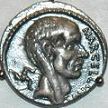


-214 Gracchus the Younger's imperium (consular power) is extended so that he can spend the year in Apulia, with HQ at Beneventum, from which Carthaginian Gen. Hanno unsuccessfully tries to dislodge him. Hannibal's successes against Rome cause Philip V of Macedonia to form an alliance with Carthage, starting the First Macedonian War with Rome (ends -205), with Rome allying with Attalus I of Pergamon; too bad, the Roman fleet in the Adriatic blocks the Macedonians from crossing to Italy to help Hannibal. Hieronymus (b. -230), the last king of Syracuse is assassinated in Leontini, and Syracuse is sieged by the Romans under Marcus Claudius Marcellus (-268 to -208), but it holds out with the brilliant defensive inventions of Alexandrian Museum man and engineer's engineer Archimedes (-287 to -212), incl. giant ship-snatching levers, the catapult (600 ft. range, which can be varied as the ships close in), and a mirror device that sets Roman ships ablaze (Greek Fire), all of which make the Romans think of him as a sorcerer. Chinese emperor Qin Shi Huang Di conquers N Vietnam, dividing it into three commandaries; he then orders construction of the the 1.4K-mi.-long Great Wall of China (Wanli Changcheng) (not really visible from space?) to protect Ch'in from the Huns of C Asia, who have advanced the art of war with ironware, stirrups, the long-range bow, and stiff military discipline. The city of Guangzhou (Canton) (originally Panyu) (modern-day pop. 14M/25M) is founded on the E bank of the Pearl River 75 mi. NNW of Hong Kong and 90 mi. N of Macau by the Qin as a military base for their first unsuccessful invasion of the Baiyue lands of S China; in 226 C.E. after being incorporated into the Han Empire, it becomes the seat of Guang Prefecture, becoming known as the Rice City, City of the Immortals, City of the Five Rams, and City of Flowers. Roman consuls: Quintus Fabius Maximus Verrucosus (4th time) and Marcus Claudius Marcellus (3rd time).
-213 Roman consuls: Gaius Claudius Centho (dictator) and Quintus Fabius Maximus and Tiberius Sempronius Gracchus the Younger. Roman Gen. Marcus Claudius Marcellus sieges Syracuse. Aratus of Sicyon is murdered, and Philopoemen becomes the leader of the aching Achaean League. Chinese emperor Shi Huang Di bans the works of Confucius, and has a massive book-and-scholar BBQ (ends -191). Reutherus (d. -187) becomes king of the Picts (Scotland). Births: Greek skeptic philosopher Carneades the Academic (d. -129) in Cyrene, N Africa; founder of the New Academy; pupil of Diogenes the Stoic, ending up opposing him and denying the existence of absolute truth; teacher of Clitomachus.
-212 The 142nd Olympiad. Publius Licinius Crassus Dives (d. -183) (direct patrilenear ancestor of Marcus Licinius Crassus), a handsome amiable man of distinguished plebeian family and great wealth is surprisingly elected Roman pontifex maximus, serving for life. Syracuse is finally captured and sacked by the Romans under Gen. Marcus Claudius Marcellus, and turned into their govt. seat in Sicily; Archimdedes (b. -287) is killed in Syracuse by a Roman soldier as he is drawing circles in the sand at the beach and telling him "Don't disturb my circles" (Noli tangere circulos meos). Roman consul Tiberius Sempronius Gracchus the Younger is slain by Hannibal's younger brother Mago, and accorded a public funeral by Hannibal. Roman proconsul Quintus Fulvius Flaccus defeats Carthaginian Gen. Hanno, then blockades and sieges Capua in SW Italy, capturing it next year and executing the senior men and selling the rest of the pop. into slavery; after they complain to the Senate, Flaccus' authority is upheld - it was the perfect balance of great taste and weight loss? Hannibal uses inside help to capture Tarentum through a ruse. Scipio the Elder captures Saguntum. Rome secures the support of the Aetolian League and Pergamum in its war against Carthage. Antiochus III of Syria leads an expedition (anabasis) to the East (ends -205), which goes as far as India. Chinese emperor Shi Huang Di orders 460 scholars burned alive in Xian Yang, and banishes his son Prince Fu Su to the Great Wall for appealing for clemency for them. Deaths: Greek super-engineer Archimedes (b. -287) in Syracuse (murdered): "Dos moi pou sto, kai kino ten gen" (Give me a place to stand, and I will move the Earth). Roman consuls: Appius Claudius Pulcher and Quintus Fulvius Flaccus (4th time).

-211 Rome allies with the Aetolian League against Philip V of Macedon. The Carthaginians knock on the doors of Rome ("Hannibal ante portas"), but give up after they fail to take the fortified Roman positions; meanwhile Capua is recaptured by the Romans despite Hannibal's efforts to save it, costing the allegiance of many of his Italian allies. Arsaces I dies, and his son Arsaces II (Artabanus) (d. -185) becomes Arsacid king #2 of the Parthians (until -185). The Roman silver denarius begins to be minted, becoming the standard silver coin; one side always has an emperor, the other side a god. Roman consuls: Publius Sulpicius Galba and Gnaeus Fulvius Centumalus.

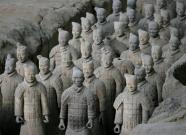

-210 Roman consuls: Quintus Fulvius Flaccus (dictator) and Marcus Valerius Laevinus and Marcus Claudius Marcellus (4th time). Publius Cornelius Scipio the Elder is made Roman cmdr. (gen. extraordinary) of Spain; until the Romans conquered it around 210 B.C.E., Spain is a hodgepodge of tribes from all over the region incl. Celts, Phoenicians, and Greeks. Lycurgus dies, and his son Pelops (-210 to -199) becomes Eurypontid king of Sparta under the regency of the tyrant Machanidas (d. -207). Do the math and save? Chinese emperor Qin Shi Huang Di (Ch'in Shih Huang Ti) (b. -259) dies suddenly on an inspection tour, and his son Hu Hai becomes Qin emperor #2 of China under the name Qin Er Shi Huang Di (Ch'in Er Shih Huang Ti) (Qin Shihuang) (d. -207); to protect him in the afterlife the Terracotta Army of Emperor Qin Shi Huang Di of 7K lifesize figures (soldiers and horses in military rank) (discovered in 1974) is built in the capital of Xi'an in NW China (at the E end of the Silk Road) in the first emperor's memorial; it takes 700K conscripts 38 years to build; it really belonged to his ancestor Empress Xuan, who died in -314?; Qin Er Shi Huang Di orders his daddy's childless concubines to be buried with him (a "very great" number of people); the terracotta army is inspired by Greek art due to the presence of Westerners in China? Architecture: Late in this cent. the Temple of Cybele is built on the Palatine Hill; Vatican City is later built over it - catch the hot chicks behaving badly show? Births: Roman statesman-gen. Tiberius Sempronius Gracchus III (d. -151); has 12 children by wife Cornelius, daughter of Scipio Africanus, all of whom die at an early age except two sons (the famous Gracchi) and a daughter. Roman gen. Quintus Caecilius Metellus Macedonicus (d. -115); eldest son of Quintus Caecilus Metellus; grandson of Lucius Caecilius Metellus; father-in-law of Publius Cornelius Scipio Nasica Serapio and Gaius Servilius Vatia. Deaths: Roman consul-gen. Tiberius Sempronius Longus (b. -260). Chinese Qin emperor #1 Qin Shi Huang (b. -259).

-209 Antiochus III the Great defeats Arsaces II at the Battle of Mount Labus (Lamavu), compels him to pay tribute, and continues his victory tour to parts east. A Roman army led by Marcus Porcius Cato Major (the Elder) (the Wise) (the Censor) (-234 to -149) recaptures Tarentum, again with inside help; it is stripped of its liberty and art treasures, incl. 1.5 tons of gold and the statue of Victory (Nike); 30K Tarantines are sold into slavery. Scipio the Elder suddenly invades and captures New Carthage (Carthago Nova), the Carthaginian capital of Spain. The former Greek town of Genua (Genoa), Italy is destroyed by the Carthaginians, then rebuilt by the Romans for use in their wars against the Ligurians. The Celts are kicked out of Thrace after 70 years (-279) - without a thrace? Chinese PM Zhao Gao (d. -207) plots to seize the throne, forcing emperor Qin Er Shi Huang Di to commit suicide in -207; the first peasant rebellion in Chinese history is led by Chen Sheng and Wu Guang Xing, but they are killed. Mongolian-born Modu Chanyu (Maodun) (-234 to -174) founds the Hun Confederacy (Xiongnu Empire) in the C Asian borderlands of China among the Xiongnu, which threatens the Hans and dominates C Eurasia (until 100 C.E.). Roman consuls: Quintus Fabius Maximus Verrucosus (5th time) and Quintus Fulvius Flaccus (5th time).


-208 The 143rd Olympiad. A severe global environmental downturn occurs; caused by comets? Scipio the Elder defeats Hannibal's brother Hasdrubal Barca (-245 to -207) at the Battle of Baecula in Spain, but fails to stop him from crossing the Pyrenees. Philopoemen (-253 to -183), "the last of the Greeks" becomes gen. of the Achaean League. Antiochus III sieges Euthydemus at Bactra (until -206). The Au Lac Kingdom in Vietnam (begun -258) ends, and the Trieu Dynasty (ends -111) begins when the gov. of one of the three Vietnamese commanderies conquers it and renames it Nam Viet (Vietnam). Roman consuls: Titus Manlius Torquatus (dictator) and Titus Quinctius Crispinus and Marcus Claudius Marcellus (fifth time). Deaths: Roman statesman-gen. Marcus Claudius Marcellus (b. -268).

-207 After he crosses the Alps to help his brother Hannibal, Hasdrubal is surprised, defeated, and slain by the Romans under consul Gaius (Caius) Claudius Nero in the Battle of the Metaurus (Metauro) River on the NE coast of Italy; Hannibal's reinforcements now kaput, he decides to retire to S Italy after learning of the disaster when the severed head of his brother is thrown into his camp - the Roman victory dance? Tyrant (regent) Machanidas of Sparta is murdered at Mantinea by the Achaean League, and the tyrant Nabis (d. -192) becomes regent, then deposes and exiles young Pelops, becoming the last king of Sparta, instituting agrarian reforms (until -204). Qin Er Shi Huang Di commits suicide, and his nephew Zi Ying (d. -206) becomes Qin emperor #3 (last) of China (until Jan. -206), ordering Zhao Gao's death. A guild of poets and actors (incl. Livius Andronicus) is formed to make votive offerings at the Temple of Minerva Medica (Roman vers. of Athena Medicus, based on the Etruscan word Menvra and easily confused with the word "mens" meaning mind, but really first worshiped by the Gauls) on the Aventine Hill in Rome, where they hold a big festival on the Ides of June (June 13), later taking over Mars' festival of the Quinquatrus on Mar. 19-23. Roman consuls: Marcus Livius Salinator (dictator) and Gaius Claudius Nero and Marcus Livinius Salinator.

-206 Hannibal is bottled by the Romans into Calabria in Italy's heel; meanwhile Roman gen. Scipio the Elder wrests Spain from Hamilcar Barca of Carthage at the Battle of Ilipa (Silpia) 10 mi N of modern-day Seville in S Spain, using the new Reverse Cannae formation to outwit them, and conquers Cordoba (Kart-Juba = "city of Juba") (modern-day pop. 326K); Spain now becomes a cash and slave cow for the Barca family of Rome; Scipio founds the city of Italica (5 mi. N of modern-day Seville) nearby for his wounded Roman soldiers, later becoming the birthplace of Roman emperors Trajan and Hadrian; the 8th cent. B.C.E. city Seville on the Guadalquivir River (modern-day pop. 703K/1.5M) is conquered and renamed Hispalis, becoming a market-industrial city, while Italica goes residential; the ancient city of Granada in Bastetania (modern-day pop. 237K) is conquered and renamed Municipium Florentinum Libertanum. The Greeks come to terms with Philip V of Macedonia. Antiochus III raises his siege and makes an alliance with Euthydemus of Bactria. E Numidian (Massylian) king Masinissa (-238 to -149) allies with Rome, and breaks with Hasdrubal, who allies with W Numidian (Masaesyli) king Syphax, who breaks with Rome. The unpopular Ch'in (Qin) Dynasty (founded -221) is overthrown by the Han Dynasty (ends 220 C.E.); Zi Ying is executed; Liu Bang (-256 to -195) and Xiang Yu (-232 to -202) become the first rival emperors of the Xi (Western) Han Dynasty in China under the titles Han Gao Zu and Chu Ba Wang. The Yin Yang School in China is founded by Tsou Yen. Roman consuls: Quintus Caecilius Metellus and Lucius Veturius Philo. Deaths: Spartan king Pelops (in exile).
-205 Philip V of Macedonia signs the Treaty of Phoenice with the Romans, ending the First Macedonian War (begun -215). Scipio the Elder returns to Rome and is elected consul. Antiochus III ends his victory tour (begun -212) by forming an alliance with Euthydemus of Bactria and making a treaty with Indian ruler Sophagaesenus. Lisbon (Olissipo) comes under Roman rule; it is allegedly already 1K-y.-o.; the Celtic Bracarenses tribe controls the area around Braga, Portugal. Roman consuls: Quintus Caecilius Metellus (dictator) and Publius Cornelius Scipio the Elder and Publius Licinius Crassus Dives (d. -183). Plays: Plautus (-254 to -184), Miles Gloriosus (The Vainglorious Soldier) (comedy).
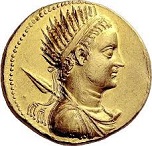


-204 The 144th Olympiad. In summer after building the huge Tessarakonteres ("forty") galley (largest human-powered vessel ever built), Ptolemy IV is murdered along with his wife Arsinoe III (b. -246) in a palace coup led by Philopater's two most powerful ministers Sosibius and Agathocles, who become regents for Ptolemy IV's 5-y.-o. son Ptolemy V Theos Epiphanes (Gr. "god manifest") (-210 to -181), who becomes king #5 of Egypt's 32nd (Ptolemaic) Dynasty, going on to lose most of Egypt's territories in the Aegean and Asia Minor; his coronation is the event described on the Rosetta Stone (-196); too bad, Agothocles soon kills Sosibius, causing the Egyptians and Greeks of Alexandria to rise against him, causing him to hole-up in the palace until his friends mercy-kill him, after which his father Agathocles, mother Oenanthe, and her sisters are dragged out by the mob, stripped naked, and torn limb from limb. Roman gen. Publius Cornelius Scipio the Elder (-236 to -183) invades Africa with an army of 30K men, landing on the coast near Utica; Fabius tries to backstab him in order to cover his own incompetence, and succeeds in restricting him to only the legions that are in Sicily, with 300 of his Spanish army. The seaport of Jaffna in N Ceylon on the Jaffna peninsula is founded by Dravidian Tamils. Roman consuls: Marcus Cornelius Cethegus and Publius Sempronius Tuditanus. Deaths: Greco-Roman poet Livius Andronicus (b. -284); leaves Odysseia, a Latinized version of Homer's Odyssey in Saturnian verse. Egyptian queen (-220 to -204) Arsinoe III (b. -246) in Alexandria (murdered by Agathocles).

-203 The Romans under Scipio the Elder invade Numidia, the back door of Carthage, with the help of E Numidian ally Masinissa, defeating a combined Carthaginian-Numidian army in the Battle of Bagrades (Camp Magni) (Great Plains), burning two Numidian camps full of men, armor, and horses, causing the Carthaginians to send urgent orders to Hannibal to quit Italy and race back by sea to defend them; the Romans sweep down on the 30K-man army (built on a core of 4K Celtiberians) of Carthaginian gen. Hasdrubal Gisco (d. -202) allied with W Numidian Berber king Syphax in the Battle of Utica near modern-day Suq al-Khamis on the Medjerda River in Tunisia; Hasdrubal and Syphax escape; Masinissa falls in love with Syphax's wife (Hasdrubal's daughter) Sophonisba (Sophoniba) (Saphan Baal) and marries her, but Scipio refuses to acknowledge it, insisting that she be surrendered to be used in a triumph in Rome, causing Masinissa to talk her into drinking poison to save herself from the humiliation; the alliance with Masinissa gives the Romans their first superiority in cavalry over the Carthaginians, which proves a big surprise later. Philip V of Macedonia allies with Antiochus III of Syria against Egypt, and begins operations in the Aegean. Roman consuls: Publius Sulpicius Galba Maximus (dictator) and Gaius Servilius Geminus and Gnaeus Servilius Caepio. Births: Greek "The Histories" historian Polybius (d. -118) in Megalopolis, Arcadia; son of Greek politician Lycortas, cavalry cmdr. of the Achaean League, who opposed Roman control of Macedonia and ended up in prison, after which his son is deported to Rome to tutor the two sons of Lucius Aemilius Paulus, becoming friends with Roman gen. Scipio the Younger, a member of the Scipionic Circle, and a true believer in Rome.

-202 On Oct. 19 after an abortive attempt at negotiations by the Romans, Scipio the Elder decisively defeats Carthage and Numidia under Hannibal Barca (-247 to -182) during an eclipse at the Battle of Zama on the Plains of Zama SW of Carthage; Hannibal, having to rely on raw troops, many of whom desert to the Romans, leaving his veterans to be slaughtered, experiences his first defeat, sending word to Carthage: "We have lost not only a battle but a war"; Scipio the Elder gains the surname Africanus. The Macedonian-Syrian treaty results in the Fifth Syrian War between Antiochus III of Syria and Philip V of Macedonia vs. Ptolemy V (ends -200). Philip V of Macedonia grants his ally Prusias I Chlorus of Bithynia the ports of Keios and Myrleia, which he renames Prusias and Apameia (Apamea). Liu Bang defeats Xiang Yu and causes him to commit suicide in Wu Jiang, ruling the Han Dynasty as sole emperor Han Gao Zu. Roman consuls: Gaius Servilius (dictator) and Marcus Servilius Pulex Geminus and Tiberius Claudius Nero.
-201 The Second Punic War (begun -219) ends with a total Roman V; Carthage agrees to allow Rome to annex Spain, to give up all of its naval fleet except 10 vessels, to pay 10K talents, and to agree not to wage war without Rome's permission; never-say-die Hannibal then immediately begins preparing to renew the struggle, amending the constitution, reducing govt. corruption, and fixing city finances; Salamanca becomes a Roman military station on the road from Augusta Emerita (Merida) to Asturica Augusta (Astorga). Philip V of Macedonia is defeated by Theophiliscus of Rhodes, Byzantium, and Attalus I of Pergamon in the Battle of Chios. Seeing their chance, Egyptian natives revolt against boy king Ptolemy V in the Nile Delta. Roman consuls: Gnaeus Cornelius Lentulus and Publius Aelius Paetus. Deaths: Roman poet-playwright Gnaeus Naevius (b. -270); leaves Bellum Punicum, a Latin epic on the First Punic War, plus numerous tragedies and comedies, some adopted from Greek originals and others based on Roman originals.